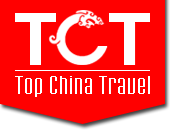
- China Tours
- Top 10 Tours
- Group Tours
- Tailor-made
- Destinations
- Classic China Tours
- Scenic China Tours
- China Cultural Tours
- Yangtze River Cruises
- Silk Road Adventure
- Tibet Tours
- Yunnan Tours
- Beijing Tours
- Shanghai Tours
- Guilin Tours
- Chengdu Tours
- Zhangjiajie Tours
- Multi-country Asia Tours
- Thailand Tours
- Vietnam Tours
- Cambodia Tours
- Myanmar Tours
- Indonesia Tours
- Singapore Tours
- Nepal Tours
- India Tours
- Japan Tours
- South Korea Tours
- Zhangjiajie
- Yangtze River
- China Travel Tips
- Best Places in China
- Chinese Culture
- China Attractions
- The Great Wall
- China Panda
- High-speed Train
- The Silk Road
- Feedbacks & Reviews

China Travel Guide
- China Overview
China Tourism
- Best Places to visit in China
- China Tourist Attractions
- The Great Wall of China
- China Giant Panda
- China High-speed Train
- Mount Everest
- Muslim Travel in China
- Maps of China

Ask a Question
I accept the Privacy Policy.
- China National Tourism Administration
Chinese President Xi Jinping has pointed out that tourism is an important channel for communications and mutual learning between different countries and cultures, an effective means for developing the economy and increasing employment. In recent years, the world tourism industry has kept growing and become the largest and fastest-growing industry in the global economy. China National Tourism Administration (CNTA in short) is an institution in charge of China tourism directly affiliated to the State Council. It is one of those very important institutions in china that foreigners’ issues get involved.

Responsibilities of CNTA
1. Coordinating the development of tourism, making development policies, planning and standards, drafting relevant laws and regulations and to supervise the implementation, as well as guiding the work of local tourism. 2. Establish and organize the implementation of the market development strategies of domestic tourism, inbound tourism and outbound tourism, organize the implementation of the publicity of the image of the National Tourism and other major promotional activities, as well as guide the work of overseas tourism offices. 3. Organize the survey, planning, development and protection of the tourism resources. Guide the planning and development of the key tourist areas, tourist destinations and tourist routes, and guide the leisure vocation industry. Monitor the operating of tourism economy and take charge of issuing tourism statistics and tourism industry information. Coordinate and guide holiday tourism and red tourism. 4. Standardize tourist market order, supervise the quality of service and maintain legal rights of tourists and operators.Normalize the operation and services of tourist enterprise and practitioners. Organize the drafting of standards on tourist regions, tourist services and tourist products, etc., and organize the implementation. Take charge of the overall coordination, supervision and management of tourist safety and emergency rescues. Guide the construction of the ideological infrastructure and the credibility system as well as operations of trade organizations. 5. Promote the international communication and cooperation of tourism and take charge of affairs relating to the cooperation with international tourism organizations. Make and organize the implement of policies of outbound tourism and border tourism. Examine and approve foreign travel agencies established in China, examine the market access qualifications of foreign-invested travel agencies and travel agencies engaged in international tourism, examine and approve overseas (outbound) tourism and border tourism cases. Take charge of affairs on special tourism.
Structure of CNTA
Assistant provided by cnta.

As tourism has become an important resource of economy growth and driving force for job creation, earning foreign exchange through export and promoting infrastructure construction. Chinese government especially the CNTA has attached great concern of travel service control, regulations and quality supervises. In recent years the quality service improvement of Chinese tourism industry has made a remarkable leap leading by the CNTA. Because we believe that the quality of tour guides and the services they provide is the key to the tourism industry perceive in China and abroad.
On 6th November 2017, CNTA had laid out new rules for tour guides ensuring the tourists in China could get a decent tour service. The new rules including punishments for tour guides who involved in misbehavior clarified, forced shopping, charge extra money against a client's wishes, steering their clients to illegal or immoral activities, such as gambling, drugs or sex. Those who break the rules will have their licenses revoked and fined as well.
Apart from those new rules, over the past a few years, Chinese CNTA has spared no effort in a hygiene program called Toilet Revolution. Many important tourist cities in China have taken part in this toilet revolution and built thousands more modern and hygiene toilet in cities especially within tour site areas to serve the tourists better in a much more comfortable and more convenience condition.
As supervise the quality of service, maintain legal rights of tourists and operators, normalize the operation and services of tourist enterprise and practitioners are one of the main functions of CNTA. Taking complaints and deal with related punishments are the main services that CNTA could do for tourists. In any rare occasion that you might need the detailed information listed below in contacting the CNTA
Institute to Receive Complain of China Tourism: Tourism Quality Supervision Management Institute of National Tourism Administration Working Time :8:30-12:00 14:30-17:00 Voice Tel : (010)65275315 ADD :A9 Jianguomennei Avenue, Beijing
Below is a list of Telephones of quality supervision institutes of several major tourism provinces and autonomous regions.
- Main Tourist Cities around China
- Historical and Cultural Cities in China
- AAAAA Scenic Areas in China
- Top 10 Most Popular Tourist Destinations in China
- Famous Tourism Trade Fairs in China
- Famous Tourism Festivals in China
- China Tourism Facts
Recommended China Tours

From $ 3637

From $ 2318 2086

From on request
We are member of

Follow us on

About us Contact us How to Book How to Pay Terms & Conditions Loyalty & Referral Programs All China Tours All City Tours All One Day Tours All Asia Tours Privacy Statement
Our license Number: L-GX-CJ00001
Copyright 2004 All Rights Reserved Top China Travel

Update April 12, 2024
Information for u.s. citizens in the middle east.
- Travel Advisories |
- Contact Us |
- MyTravelGov |
Find U.S. Embassies & Consulates
Travel.state.gov, congressional liaison, special issuance agency, u.s. passports, international travel, intercountry adoption, international parental child abduction, records and authentications, popular links, travel advisories, mytravelgov, stay connected, legal resources, legal information, info for u.s. law enforcement, replace or certify documents.
Before You Go
Learn About Your Destination
While Abroad
Emergencies
Share this page:
Travel Advisory April 12, 2024
Mainland china, hong kong & macau - see summaries.
Updated due to new national security legislation in the Hong Kong Special Administrative Region.
Summary: Reconsider travel to Mainland China due to the arbitrary enforcement of local laws, including in relation to exit bans, and the risk of wrongful detentions.
Exercise increased caution when traveling to the Hong Kong Special Administrative Region (SAR) due to the arbitrary enforcement of local laws .
Reconsider travel to the Macau Special Administrative Region (SAR) due to a limited ability to provide emergency consular services . Exercise increased caution when traveling to the Macau SAR due to the arbitrary enforcement of local laws .
See specific risks and conditions in each jurisdiction .
Embassy Messages
View Alerts and Messages Archive
Quick Facts
Recommend consult with travel clinic
Max RMB 20,000
Embassies and Consulates
U.S. Embassy Beijing No. 55 An Jia Lou Road Chaoyang District, Beijing 100600 Telephone: +86 10-8531-4000 Emergency After-Hours Telephone: +86 10-8531-4000 Fax: +86 10-8531-3300 Email: [email protected] This consular district includes Beijing, Tianjin, Gansu, Hebei, Inner Mongolia, Ningxia, Qinghai, Shaanxi, Shandong, Shanxi, Xinjiang, Chongqing, Guizhou, Sichuan, Yunnan, and Tibet.
U.S. Consulate General Hong Kong & Macau 26 Garden Road Central, Hong Kong Telephone: +852 2841-2211, +852 2841-2225, +852 2841-2323 Emergency After-Hours Telephone: +852 2523-9011 Fax: +852 2845-4845 Email: [email protected] This consular district includes the Hong Kong and Macau Special Administrative Regions (SARs).
U.S. Consulate General Guangzhou No. 43 Hua Jiu Road Zhujiang New Town Tianhe District, Guangzhou 510623 Telephone: +86 20-3814-5775 Emergency After-Hours Telephone: +86 10-8531-4000 Fax: +86 20-3814-5572 Email: [email protected] This consular district includes Fujian, Guangdong, Guangxi, and Hainan.
U.S. Consulate General Shanghai No. 1469 Huai Hai Zhong Road Xuhui District, Shanghai 200041 Telephone: +86 21-8011-2400 Emergency After-Hours Telephone: +86 10-8531-4000 Fax: +86 21-6148-8266 Email: [email protected] This consular district includes Shanghai, Anhui, Jiangsu, and Zhejiang.
U.S. Consulate General Shenyang No. 52 14th Wei Road Heping District, Shenyang 110003 Telephone: +86 24-2322-1198 Emergency After-Hours Telephone: +86 10-8531-4000 Fax: +86 24-8610-6904 Email: [email protected] This consular district includes Heilongjiang, Jilin, and Liaoning.
U.S. Consulate General Wuhan No. 396 Xin Hua Road Wuhan Minsheng Bank Building Jianghan District, Wuhan 430015 Telephone: +86 27-8563 2800 Emergency After-Hours Telephone: +86 10-8531-4000 Fax: +86 27-5949 6496 Email: [email protected] This consular district includes Henan, Hubei, Hunan, and Jiangxi.
Destination Description
See the U.S. Department of State’s Fact Sheet on the People's Republic of China for information on U.S.-China relations.
Entry, Exit and Visa Requirements
Entry & Exit:
- Obtain a visa prior to arrival in the People’s Republic of China (PRC) and have a passport with at least six months' validity remaining. The lack of either will result in a fine and immediate deportation upon arrival.
- Apply for a ten-year multiple entry visa, useful for repeated travel, or trips to the Hong Kong or Macau Special Administrative Regions (SARs) with returns to mainland China.
- If you plan to work in the PRC, be sure to obtain the correct visa. Working in the PRC is not permissible on a student or tourist visa, and may result in detention, criminal charges, imprisonment, and deportation.
- You must have a valid visa to exit the PRC and you must leave the PRC before the expiration of the listed duration of stay.
- Do not travel to the PRC if you have a warrant for your arrest in the United States.
Lack of a visa, having an expired visa, or overstaying your visa will result in detention and/or fines.
- Apply for a visa extension from the local Entry-Exit Bureau before attempting to leave the PRC. Do not expect your request to be expedited, so apply ahead of time.
- Staying in the PRC on an expired visa may lead to a fine, imprisonment, and deportation.
- Visit the website of the Embassy of the People’s Republic of China in the United States of America for current visa information as well as information on the PRC’s immigration and nationality laws.
The Tibet Autonomous Region (TAR): The TAR requires special permits for tourist travel, most often obtained through a travel agent in the PRC. If you do enter a restricted area without the requisite permit, you could be fined, taken into custody, and deported for illegal entry. To learn more about specific entry requirements for the TAR or other restricted areas, check with the Embassy of the People’s Republic of China in the United States of America . The U.S. Department of State is unaware of any HIV/AIDS entry restrictions for visitors to or foreign residents of the PRC. Transiting the PRC:
- When transiting certain international airports, you may stay in mainland China without a PRC visa. However, this “visa-free travel” permit is only valid for the city of arrival and does not allow you to visit other cities in the PRC.
- The duration of allowed stay and how broadly you may travel varies by region.
- Transiting without a visa requires a valid passport with at least six months of remaining validity, a visa for your onward destination (if necessary), and an onward ticket from the same location.
- You must inform your airline upon check-in and get an endorsement stamp at the immigration desk before leaving the airport.
- Consult the Embassy of the People’s Republic of China in the United States of America for a current list of eligible airports and more detailed guidance.
- PRC border officials have the authority to deny foreign travelers’ entry to the PRC without warning or explanation. The U.S. Embassy and Consulates General cannot intervene on your behalf if denied entry to the PRC.
During Your Stay:
- Failure to register your stay within 24 hours of arrival in the PRC could result in fines and deportation. You can register with hotel staff or the local police station.
- Local regulations require foreigners to carry valid passports and PRC visas or residence permits at all times.
- Entry and exit requirements are strictly enforced, as are restrictions on activities allowed by any particular visa class.
- Police, school administrators, transportation officials, and hotel staff may check your visa to make sure you have not overstayed. If you overstay your visa’s duration of stay, you may be denied service by hotels, airports, and train stations, as well as face fines and detention.
- If you encounter problems in the Tibet Autonomous Region, the U.S. government has limited ability to provide assistance because the PRC government does not usually authorize U.S. government personnel to travel there, even to provide consular assistance to U.S. citizens.
Dual Nationality: The PRC government does not recognize dual nationality. If you are a dual national of the United States and the PRC, or otherwise have ethnic or historical ties to the PRC, it is possible that PRC authorities will assert that you are a PRC citizen, limit your ability to access certain consular services, and, if you are detained, deny your access to U.S. consular officials. Because the PRC government does not recognize dual citizenship, dual U.S.-PRC citizens may face a number of hurdles when seeking public benefits in the PRC. U.S. citizens who are also citizens of the PRC may experience difficulty in accessing benefits in the PRC, such as enrollment in public schools, treatment at public hospitals and clinics, or obtaining PRC identity and citizenship documents, such as passports. U.S.-PRC dual citizens must navigate conflicting aspects of PRC nationality, which the PRC government may inconsistently apply.
If you are a naturalized U.S. citizen or have a possible claim to PRC citizenship, and you are traveling to the PRC, inform yourself about PRC nationality law and practices relating to determination and loss of PRC citizenship. PRC authorities generally consider a child born in the PRC to at least one PRC-national parent to be a PRC citizen, even if the child was issued a U.S. passport at the time of birth. If you have or had a claim to PRC citizenship and your child is born in the PRC, prior to departing the PRC with your child, you may wish to contact the local Public Security Bureau and/or Entry-Exit Bureau for information on obtaining a travel document. If you have or had a claim to PRC citizenship and your child is born in the United States, please contact the Embassy of the People’s Republic of China in the United States of America for specific information on the documentation requirements to bring your child to the PRC.
Find information on dual nationality , prevention of international child abduction , and customs regulations on our websites.
Safety and Security
For most visitors, the PRC remains a very safe country. Traffic accidents are the most common safety concern for U.S. citizens. Training, capability, and responsiveness of PRC authorities vary by region and even by city. The U.S. Embassy and Consulates General have no law enforcement authority and may not represent U.S. citizens in either criminal or civil legal matters.
To ensure your safety and security in the PRC, you should:
- Take routine safety precautions.
- Pay attention to surroundings.
- Report any concerns to the local police.
- Call “110,” the local equivalent to “911”. English services are often available, but you should not expect English services in remote parts of the PRC.
Violent crime is not common in the PRC, however:
- While sanctioned demonstrations must be approved by PRC authorities, they can turn violent.
- Domestic unrest and terrorism can occur.
- Business disputes between U.S. citizens and PRC-national business partners can sometimes result in physical confrontation, detainment, or coercion. Go straight to the police if you feel threatened or relocate to a public place.
Be alert to criminal schemes, such as:
- “Tourist Tea” Scams: PRC nationals invite visitors out to tea and leave them with an exorbitant bill.
- Phone Scams: Callers pose as police officers and request a funds transfer to resolve an identity theft or money laundering investigation. In these cases, DO NOT WIRE any money. If you receive any suspicious calls or requests, contact the local Public Security Bureau to verify the caller’s identity.
- “Unlicensed or Unapproved Cabs”: Taxi and ridesharing services in China are generally licensed by authorities. Be cautious when using taxi or ridesharing services that are not accessible through mobile applications. If you use the locally approved taxi service, insist that the driver use the meter, and get a receipt. Have the name of your destination written in Chinese characters and ask the driver to remove the bags from the trunk before you get out of the taxi and before you pay.
- Counterfeit Currency: Although counterfeit currency has been a concern in the PRC the past, making purchases in cash is increasingly less common as most vendors prefer payments through local mobile payment apps. When you need cash, use only ATMs at trusted financial institutions, and carry a variety of denominations as vendors may have limited cash on hand as change.
Be alert to criminal schemes, such as internet, phone scams, dating scams, as well as financial scams. If you already have been victim of a scam, catalogue as many details as possible, including names, telephone and bank numbers, and email and IP addresses; file a police report, and inform the U.S. Embassy or nearest U.S. Consulate General. See the U.S. Department of State's and the U.S. Federal Bureau of Investigation (FBI)'s pages for information on scams. Victims of Crime: Report crimes to the local police and contact the U.S. Embassy or nearest Consulate General. U.S. citizen victims of sexual assault can contact the local police and should contact the U.S. Embassy or nearest U.S. Consulate General.
Remember that local authorities are responsible for investigating and prosecuting the crime. See our webpage on help for U.S. victims of crime overseas .
We can:
- Help you find appropriate medical care.
- Assist you in reporting a crime to the police.
- Contact relatives or friends with your written consent.
- Provide general information regarding the victim’s role during the local investigation and following its conclusion.
- Provide a list of local attorneys.
- Provide our information on victim’s compensation programs in the United States .
- Provide an emergency loan for repatriation to the United States and/or limited medical support in cases of destitution.
- Help you find accommodation and arrange flights home.
- Replace a stolen or lost passport.
Lost or Stolen Passports: If your passport is stolen, you must apply for both a new passport at the U.S. Embassy or nearest U.S. Consulate General and a new PRC visa. File a police report at the nearest police station right away. You may also be directed to file a report at the local Exit-Entry Bureau .
Domestic Violence: U.S. citizen victims of domestic violence may contact the U.S. Embassy or nearest U.S. Consulate General for assistance. Domestic violence in the PRC is rarely recognized as a crime.
Tourism: The tourism industry is unevenly regulated, and safety inspections for equipment and facilities do not commonly occur. Hazardous areas/activities are not always identified with appropriate signage, and staff may not be trained or certified either by the PRC government or by recognized authorities in the field. In the event of an injury, appropriate medical treatment is typically available only in/near major cities. First responders are generally unable to access areas outside of major cities to provide urgent medical treatment. U.S. citizens are encouraged to purchase medical evacuation insurance .
Local Laws & Special Circumstances
Criminal Penalties: You are subject to local laws. If you violate local laws, even unknowingly, you may be expelled, arrested, or imprisoned.
Some laws are also prosecutable in the United States, regardless of local law. See crimes against minors abroad and the U.S. Department of Justice website.
Arrest Notification: If you are arrested or detained, ask police or prison officials to notify the U.S. Embassy or nearest U.S. Consulate General immediately.
- PRC authorities must notify a U.S. consular officer within four days; however, this does not always occur in a timely manner.
- A consular officer may be the only authorized visitor during your initial detention period.
- Bail is rarely granted.
- Detention may last many months before a trial.
- The U.S. Embassy or nearest U.S. Consulate General is unable to represent you in a legal matter.
- Travelers to the PRC should enroll in the State Department’s Smart Traveler Enrollment Program (STEP) and you may wish to have someone contact the U.S. Embassy or nearest U.S. Consulate General if you are detained.
- Please see the section on DUAL NATIONALITY for the limits on consular notification and access to dual nationals.
- See U.S. Department of State’s webpage for further information.
The PRC legal system can be opaque and the interpretation and enforcement of local laws arbitrary. The judiciary does not enjoy independence from political influence. U.S. citizens traveling or residing in the PRC should be aware of varying levels of scrutiny to which they will be subject from local law enforcement and state security.
Certain provisions of the Criminal Law of the People’s Republic of China, such as “social order” crimes (Article 293) and crimes involving “endangering state security” and “state secrets” (Article 102 to 113), are ill-defined and can be interpreted by the authorities arbitrarily and situationally. Information that may be common knowledge in other countries could be considered a “state secret” in the PRC, and information can be designated a “state secret” retroactively. Drug and Alcohol Enforcement:
PRC law-enforcement authorities have little tolerance for illegal drugs, including marijuana. Penalties for possessing, using, or trafficking illegal drugs in the PRC are severe, and convicted offenders can expect long jail sentences, heavy fines, or the death penalty. Police regularly conduct unannounced drug tests on people suspected of drug use and have been known to enter a bar or nightclub and subject all patrons to immediate drug testing. Police may force you to provide a urine, blood, or hair follicle sample on short notice. A positive finding, even if the drug was legal elsewhere or consumed prior to arriving in the PRC, can lead to immediate detention, fines, deportation, and/or a ban from re-entering the PRC.
The PRC also has strict laws against driving under the influence of alcohol that can lead to immediate detention on a criminal charge.
Assisted Reproductive Technology: In vitro fertilization (IVF) is widely and legally practiced. PRC law, however, strictly forbids surrogacy, and surrogacy contracts will not be considered valid. The use of reproductive technology for medical research and profit is strictly controlled. Contracts and Commercial Disputes: Before entering into a commercial or employment contract in the PRC, have it reviewed by legal counsel both in the United States and in the PRC. The U.S. International Trade Administration can assist you in identifying and vetting business contacts and opportunities but may not intervene in contract disputes. Many U.S. citizens have reported difficulty getting their contracts enforced by PRC courts or being forced out of profitable joint-ventures without opportunity to secure legal recourse in the PRC. Counterfeit Goods: Do not buy counterfeit or pirated goods. Bootlegs are illegal in the United States, and you may also be breaking local law by purchasing them.
Cruise Ship Passengers: Click here for safety information and travel advice .
Digital Payments: The PRC has transitioned to almost a predominantly cashless society. Some mobile phone applications offer a digital payment solution for individuals visiting the PRC on a temporary or long-term basis. Often, payment is made through an individual using their mobile phone to scan a vendor or business’s QR code. The number of locations accepting foreign credit cards has decreased in recent years. Visitors to the PRC should research whether the locations they are visiting will accept foreign credit cards and familiarize themselves with mobile digital payment options prior to traveling to the PRC.
Earthquakes: Earthquakes occur throughout the PRC. Check here for information about preparing for a crisis or disaster overseas.
English/Secondary School Teachers: English teachers in the PRC frequently report employment disputes which can result in questioning by local authorities, termination, lost wages, confiscation of passports, forced eviction from housing, and even threats of violence.
Exit Bans: Business disputes, court orders to pay a settlement, or government investigations into both criminal and civil issues may result in an exit ban which will prohibit your departure from the PRC until the issue is resolved. Even individuals and their family members who are not directly involved, or even aware of these proceedings, can be subject to an exit ban. Additionally, some local businesspeople who feel that they have been wronged by a foreign business partner may hire "debt collectors” to harass, intimidate, and sometimes physically detain foreign business partners or family members in hopes of collecting the debt. The U.S. Embassy or nearest U.S. Consulate General can provide a list of local attorneys who serve U.S. clients but are otherwise unable to intervene in civil cases. Local law enforcement authorities are generally unwilling to become involved in what they consider private business matters and may not provide the individual who has been barred from leaving the PRC with any written notice of the exit ban.
Faith-Based Travelers: See our following webpages for details:
- Faith-Based Travel Information
- International Religious Freedom Reports
- Country Reports on Human Rights Practices
- Hajj Fact Sheet for Travelers
- Best Practices for Volunteering Abroad
LGBTQI+ Travelers: Same sex marriages are not legally recognized in the PRC and local authorities will not provide marriage certificates to same-sex couples. There are no civil rights laws that prohibit discrimination or harassment based on sexual orientation or gender identity, though homosexuality has been decriminalized. Prejudices and discrimination still exist in many parts of the country. There are growing LGBTQI+ communities in some of the largest cities in the PRC and violence against LGBTQI+ individuals in the PRC is relatively rare. See Section 6 of our Human Rights Practices in the Human Rights Report for the People's Republic of China and read our LGBTQI+ Travel Information page .
Non-Governmental Organizations (NGOs): In January 2017, the PRC implemented a law regulating the operations of foreign NGOs in the PRC. NGOs and their employees should ensure they are complying with all relevant statutory requirements, particularly if working in sensitive areas or fields. Additionally, the PRC government announced sanctions on five U.S.-based NGOs in December 2019.
North Korea: Do not travel to the Democratic People’s Republic of Korea (North Korea) due to the serious risk of arrest and long-term detention of U.S. nationals. For further information, consult the North Korea International Travel Information page and the North Korea Travel Advisory .
Political and Religious Activity: Participating in unauthorized political or religious activities, including participating in public protests or sending private electronic messages critical of the government may result in detention and PRC government-imposed restrictions on future travel to the PRC. Although the PRC constitution permits freedom of religious belief, it does not permit freedom of religious practice and government officials are increasing pressure on domestic religious activities. The U.S. Mission to the PRC has observed an increase in the number of U.S. citizens being interrogated, detained, and/or forced to leave the country in connection with real or perceived religious proselytization. U.S. citizens have been detained and/or expelled for distributing religious literature, including Bibles, or engaging in unauthorized religious meetings. If you bring religious literature with you, local law dictates that it be a “reasonable amount” for your personal use. If you attempt to bring larger quantities, the literature will likely be confiscated and you may be fined, detained, or deported. Social Insurance: The PRC has a social insurance system to which foreigners who work in the PRC must contribute. When you sign an employment contract, you must apply for a social insurance number, and it is important that your employer work with you to comply with the regulations. Please check the official website for updated information. Social Media: Social media accounts are widely monitored in the PRC. Local authorities may use information they deem critical, controversial, or that might involve illegal activity against both the poster of the material and the host of the social media forum under local law. Individuals have also been held responsible for the content that others place within social media spaces they control, such as the comments section under a post or within a group chat that an individual controls.
Special Scrutiny of Foreign Citizens: On occasion, U.S. citizens visiting or resident in the PRC have been interrogated or detained for reasons said to be related to “state security.” In such circumstances, you could face arrest, detention, or an exit ban prohibiting your departure from the PRC for a prolonged period. Dual U.S.-PRC nationals and U.S. citizens of Chinese heritage may be at a higher risk of facing such special scrutiny. Information about dual nationality can be found on our website. Students: See our U.S. Students Abroad page and FBI travel tips .
Surveillance and Monitoring: Security personnel carefully watch foreign visitors and may place you under surveillance. Hotel rooms (including meeting rooms), offices, cars, taxis, telephones, internet usage, digital payments, and fax machines may be monitored onsite or remotely, and personal possessions in hotel rooms, including computers, may be searched without your consent or knowledge. Security personnel have been known to detain and deport U.S. citizens sending private electronic messages critical of the PRC government. Transferring Money to/from the PRC: The regulatory environment in the PRC includes tightening capital outflow controls that can severely impact one’s ability to move money out of the country. Wire transfers may only be available to those who have an active bank account in the PRC. Ask your local bank location in the PRC for more information. The U.S. Department of State may be able to help transfer funds to a destitute U.S citizen overseas through our office in Washington, D.C., to a U.S. Embassy or U.S. Consulate General abroad. More information on this option is available here .
Travelers Who Require Accessibility Assistance: U.S. citizens with mobility disabilities may face challenges while traveling in the PRC. Sidewalks often do not have curb cuts and many streets can be crossed only via pedestrian bridges or underpasses accessible by staircase. Assistive technologies for blind people and those with other vision disabilities are unreliable, and access to elevators in public buildings can be restricted. In major cities, public restrooms in places visited by tourists usually have a least one accessible toilet. See Persons with Disabilities in the Human Rights Report for the People's Republic of China (2022) .
Typhoons: The southeast coast of the PRC is subject to strong typhoons and tropical storms, usually from July through September. For current information, please consult the Joint Typhoon Warning Center in Honolulu and the National Weather Service's Central Pacific Hurricane Center . Women Travelers: If you are a woman traveling abroad, please review our travel tips for Women Travelers .
Xinjiang Uyghur Autonomous Region: Extraordinary security measures are in place through the region. Authorities may impose curfews and restrictions on short notice. They may also engage in invasive surveillance techniques against individuals. Expect significant travel delays, avoid gatherings and demonstrations, always carry ID, and follow the instructions of local authorities. Travelers with ethnic ties to the region may experience special restrictions, discrimination, and even arbitrary detention.
COVID-19 Entry Requirements: There are COVID-related entry requirements in place for U.S. citizens.
- As of May 3, 2023, a negative COVID-19 PCR test or rapid antigen test (home tests are acceptable) within 48 hours of boarding is required for entry. Test results must be self-declared through a Health Declaration Form or through the China Customs smartphone app. Airlines will not check test results anymore. For more information, please see this notice .
- No proof of vaccination against COVID-19 is required for entry.
- There is no quarantine period for travelers upon arrival.
COVID-19 Testing: U.S. citizens can obtain a COVID-19 test at most hospitals and clinics in the PRC. They can choose between PCR and antigen tests, which are both available. The cost of the test is about $17 U.S. dollars, but it may vary depending on the location. The test fee is not covered by the host government and must be paid by the U.S. citizen. Test results are usually returned within 12 to 24 hours by email, text, or an update to the local COVID-19 monitoring app. For more information, please see this notice .
COVID-19 Vaccines: Certain COVID-19 vaccines are available for U.S. citizens to receive in the PRC.
- The PRC government has conditionally authorized several vaccines that are currently available to foreigners residing in the PRC. The two most commonly available, Sinopharm and Sinovac, have not yet received approval by the Food and Drug Administration (FDA) of the United States. Sinopharm and Sinovac have received approval for emergency use by the World Health Organization (WHO). Please contact your local health authorities for more information.
- Visit the FDA's website to learn more about FDA-approved vaccines in the United States.
Quality of Care: The standards of medical care in the PRC are not equivalent to those in the United States. Even in private hospitals or public hospitals with well-equipped wards, English-speaking patients frequently encounter difficulty due to cultural, language, and regulatory differences. Rural areas have rudimentary facilities and inadequate staffing. Additionally, Rh-negative blood may be difficult to obtain; the blood type of the general Asian populace is Rh positive. Payment and Insurance: Ambulances in the PRC are often slow to arrive, and most do not have sophisticated medical equipment or trained responders. Cash payment for services is often required prior to treatment, including emergency cases. Travelers will be asked to post a deposit prior to admission to cover the expected cost of treatment. Hospitals in major cities may accept credit cards. The U.S. Embassy and Consulates General in the PRC maintain lists of local English-speaking doctors and hospitals . Use of Medicare/Medicaid in the PRC: Be aware that U.S. Medicare/Medicaid does not apply overseas. Hospitals and doctors in the PRC often do not accept U.S. health insurance.
Medical Insurance: Make sure your health insurance plan provides coverage overseas. Most care providers overseas only accept cash payments. See our webpage for more information on insurance coverage overseas. Visit the U.S. Centers for Disease Control and Prevention (CDC) for more information on type of insurance you should consider before you travel overseas.
We strongly recommend supplemental insurance to cover medical evacuation.
Medication: If traveling with prescription medication, check with the Embassy of the People’s Republic of China in the United States of America to ensure the medication is legal in the PRC. Carry prescription medication in original packaging, along with the prescription. Many commonly used U.S. drugs and medications are not available in the PRC, and counterfeit, low-quality knockoffs are prevalent. If you try to have medications sent to you from outside the PRC, you may have problems getting them released by PRC Customs authorities and/or you may have to pay high customs duties. Air Quality: Air pollution is a significant problem in many locations. Visit AirNow Department of State for information on air quality at U.S. Embassies and Consulates. The PRC’s Ministry of Ecology and Environment also provides its own air quality data for cities throughout the PRC. Most roads and towns in Tibet, Qinghai, parts of Xinjiang, and western Sichuan are situated at altitudes over 10,000 feet. Take appropriate precautions to prepare for and be alert to altitude sickness. Disease: The following diseases are prevalent:
- Hepatitis A
- Hepatitis B
- Tuberculosis
- Sexually transmitted infections (e.g., syphilis)
Vaccinations: Be up to date on all routine vaccinations recommended by the CDC. The CDC traveler’s health site for the PRC provides vaccine recommendations specific to travel within the PRC.
For further health information :
- World Health Organization (WHO)
- U.S. Centers for Disease Control and Prevention (CDC)
Travel and Transportation
Road Conditions and Safety: Traffic safety is generally poor, and driving can be dangerous, though rules, regulations, and conditions vary greatly throughout the PRC.
Traffic can be chaotic and largely unregulated and the rate of accidents, including fatal accidents, is among the highest in the world. Motorcycle and bicycle accidents are frequent and often deadly. Pedestrians do not have the right of way, and you should show extreme caution when walking in traffic, even in marked crosswalks. Child safety seats are not widely available.
Traffic Laws:
- You may not drive in the PRC using a U.S. or international driver’s license.
- You can apply for a PRC driver’s license if you have a resident permit.
- If you are involved in a traffic accident, stay calm and call and wait for the police.
- If there are no injuries and damage is minimal, the parties often come to agreement on the spot.
- Unresolved disputes are handled by the courts.
- In cases involving injuries, the driver determined at fault is responsible for the injured person’s medical costs. Sometimes, the police may hold your passport until the other parties are satisfied with the compensation they receive.
Please refer to our Road Safety page for more information. Also, please review the Law of the People's Republic of China on Road Traffic Safety .
Public Transportation: Public transportation, including subways, trains, and buses, generally has a positive safety record and is widely available in major cities, although individuals on crowded buses and subways can be targeted by pickpockets. Aviation Safety Oversight: The U.S. Federal Aviation Administration (FAA) has assessed the PRC government’s Civil Aviation Authority as being in compliance with International Civil Aviation Organization (ICAO) aviation safety standards for oversight of the PRC’s air carrier operations. Further information may be found on the FAA’s Safety Assessment Page .
Maritime Travel: Mariners planning travel to the PRC should check for U.S. maritime advisories and alerts at the U.S. Department of Transportation (DOT) Maritime Security Communications with Industry (MSCI) web portal. Information may also be posted to the U.S. Coast Guard Homeport website , and the U.S. National Geospatial-Intelligence Agency (NGA) Navigational Warnings website .
The Commandant of the Coast Guard is unable to determine if effective anti-terrorism measures are in place in PRC ports as required by 46 U.S. Code § 70108.
For additional travel information
- Enroll in the Smart Traveler Enrollment Program (STEP) to receive security messages and make it easier to locate you in an emergency.
- Call us in Washington, D.C. at 1-888-407-4747 (toll-free in the United States and Canada) or 1-202-501-4444 (from all other countries) from 8:00 a.m. to 8:00 p.m., Eastern Standard Time, Monday through Friday (except U.S. federal holidays).
- See the State Department’s travel website for the Worldwide Caution and Travel Advisories .
- Follow us on Twitter and Facebook .
- See traveling safely abroad for useful travel tips.
Review information about International Parental Child Abduction in China . For additional IPCA-related information, please see the International Child Abduction Prevention and Return Act ( ICAPRA ) report.
Travel Advisory Levels
Assistance for u.s. citizens, learn about your destination, enroll in step.

Subscribe to get up-to-date safety and security information and help us reach you in an emergency abroad.
Recommended Web Browsers: Microsoft Edge or Google Chrome.
Make two copies of all of your travel documents in case of emergency, and leave one with a trusted friend or relative.
Afghanistan
Antigua and Barbuda
Bonaire, Sint Eustatius, and Saba
Bosnia and Herzegovina
British Virgin Islands
Burkina Faso
Burma (Myanmar)
Cayman Islands
Central African Republic
Cote d Ivoire
Curaçao
Czech Republic
Democratic Republic of the Congo
Dominican Republic
El Salvador
Equatorial Guinea
Eswatini (Swaziland)
Falkland Islands
France (includes Monaco)
French Guiana
French Polynesia
French West Indies
Guadeloupe, Martinique, Saint Martin, and Saint Barthélemy (French West Indies)
Guinea-Bissau
Isle of Man
Israel, The West Bank and Gaza
Liechtenstein
Marshall Islands
Netherlands
New Caledonia
New Zealand
North Korea (Democratic People's Republic of Korea)
Papua New Guinea
Philippines
Republic of North Macedonia
Republic of the Congo
Saint Kitts and Nevis
Saint Lucia
Saint Vincent and the Grenadines
Sao Tome and Principe
Saudi Arabia
Sierra Leone
Sint Maarten
Solomon Islands
South Africa
South Korea
South Sudan
Switzerland
The Bahamas
Timor-Leste
Trinidad and Tobago
Turkmenistan
Turks and Caicos Islands
United Arab Emirates
United Kingdom
Vatican City (Holy See)
External Link
You are about to leave travel.state.gov for an external website that is not maintained by the U.S. Department of State.
Links to external websites are provided as a convenience and should not be construed as an endorsement by the U.S. Department of State of the views or products contained therein. If you wish to remain on travel.state.gov, click the "cancel" message.
You are about to visit:
We’re sorry, this site is currently experiencing technical difficulties. Please try again in a few moments. Exception: request blocked
News & Events

- INSTITUTIONS

The State Council, in a circular on Jan 20, announced a development plan for the tourism sector during the 14th Five-Year Plan period (2021-2025).
By 2025, China will have a stronger modern system for the tourism sector integrating cultural development and boasting an improved barrier-free environment and services. By 2035, the country aims to become a world tourism powerhouse, with a wider variety of tourist hot spots, including national cultural parks, world-class tourist attractions and resorts, and State-level cities and blocks serving tourism and leisure.
Modern tourism requires supply-side structural reform, high-quality tourism products, and integration with other industries, the circular said.
It involves promoting smart tourism with digital, networked and intelligent scenarios and expanding the application of new technologies in tourism.
To incorporate tourism into major regional strategies and coordinated development, the circular urged efforts to harness the four national cultural parks covering the Great Wall, the Beijing-Hangzhou Grand Canal, the route of the Long March and the Yellow River, and the Silk Road tourism belt, among others, to blaze new travel trails across China.
Other efforts include building world-class tourism cities such as Guilin to drive regional tourism and encouraging more cities to list tourism and leisure as basic urban functions.
Tourism development, the circular said, should pursue harmonious co-existence with nature in steadily building national cultural parks and national parks, protecting historical resources, based on general surveys of Chinese cultural resources, and natural resources.
National cultural parks, it added, should seek to highlight the unique creations, values and distinctive characteristics of the Chinese culture.
To advance mass tourism and consumption, preferential policies, services, and public infrastructure should keep up with emerging development patterns such as contactless tourism and consumption.
A modern tourism governance system should be in place for handling tourist complaints to safeguard their legitimate rights and interests, emergency responses, as well as prevention and control of major risks from disasters and accidents.
The plan maps out promoting inbound and outbound travel in an orderly, steady manner, on the premise that the global COVID-19 pandemic is brought under control. With epidemic prevention and control prioritized, entries to China should be subject to real-name reservation of tickets, and inbound travel by cruise ship and self-driving tours should be facilitated with easier customs clearance.
Cooperation with Hong Kong, Macao and Taiwan, and international collaboration in the tourism industry are also stressed.
- China issues block recommendation list for tourism, leisure
- China's tourism industry sees strong post-pandemic recovery
- China sees robust tourism, consumption during National Day holiday
Copyright© www.gov.cn | About us | Contact us
Website identification code bm01000001 registration number: 05070218, all rights reserved. the content (including but not limited to text, photo, multimedia information, etc) published in this site belongs to www.gov.cn., without written authorization from www.gov.cn, such content shall not be republished or used in any form., copyright© www.gov.cn | contact us, website identification code bm01000001, registration number: 05070218.
- Share full article
Advertisement
Supported by
China’s Travel Economy Is Slowly Coming Back. Here’s Where It Stands.
Over a year after China opened its borders following the pandemic, international trips are still lagging, although domestic travel is more popular.

By Tiffany May
Reporting from Hong Kong
Since China reopened its borders in 2023 after three years of Covid isolation, domestic travel has thrived and high-speed rail has grown increasingly popular. But international trips in and out of the country are lagging, and flight capacity is still just two-thirds of prepandemic levels.
The economic stakes are high. Before the pandemic, Chinese travelers were the world’s biggest spenders, accounting for 20 percent of global tourism spending, according to the United Nations World Tourism Organization.
In the past year, the Chinese authorities have tried to spur more inbound travel. Among the changes: China has waived travel visas or agreed to extend the length of visa-free travel for visitors from eight countries, including Germany and France.
The main factor holding back international travel by Chinese will continue to be China’s economy. Growth has bounced back from the pandemic, but the weight of a severe real estate downturn has dampened consumer spending and confidence inside China. And global geopolitical tensions remain a wild card. China is engaged in trade disputes with the United States and Europe, home to many major multinational companies. As they think twice about their business in China, travel suffers.
Here’s what to know about the state of China’s travel economy.
Travel to China ground nearly to a halt in the pandemic. It won’t fully recover until 2025.
Throughout the pandemic, China enforced some of the strictest travel rules in the world. Overseas travelers who managed to enter the country sometimes had to quarantine at their own expense for as long as two months.
As of December, international flight capacity — essentially the number of available seats on flights coming from and going to China — was only 62 percent of what it was in December 2019, according to OAG, a flight data analytics firm. But domestic travel has picked up: Over the 3-day weekend at the end of last month, the number of those fliers exceeded prepandemic levels by nearly 10 percent.
At the start of last year, there were only about 500 international flights every week in China, according to the Civil Aviation Administration of China, the aviation regulator. Now there are about 4,600, and that number is expected to increase to 6,000 by the end of the year — about 80 percent of prepandemic levels.
A big test will come next month during the spring festival around the Lunar New Year, typically a heavy travel period when millions of workers travel to their hometowns. Chinese airlines will schedule 2,500 additional international flights to accommodate spring festival visits, China’s aviation regulator said last week.
China’s transport officials said they expected 480 million rail trips to be made during a 40-day travel surge around the spring festival in the weeks before and after the Lunar New Year, a nearly 40 percent increase from last year.
High-speed rail has become a more popular way to travel within the country. China State Railway Group, the national rail operator, said rail trips exceeded 20 million at the start of the Golden Week holiday in October, a high, and the average daily number of passenger trips throughout the year exceeded 10 million.
Most analysts said they believed that the full recovery of international travel wouldn’t happen until 2025.
In a January research note, economists at Nomura, a Japanese bank, said the pace of the sector’s recovery would largely be determined by how much Chinese travelers were willing to spend. Pandemic-era problems like delays in issuing visas and passports that lasted through 2023 have been addressed.
“While supply-side constraints eased, the demand-side drag is now starting to kick in, and sizable headwinds remain for China’s outbound tourism recovery in 2024 and possibly 2025,” the Nomura economists wrote.
Applying for a visa and visiting China are a bit less complicated.
In December, China started allowing visitors from France, Germany, Italy, Spain, Malaysia and the Netherlands to travel for 15 days without visas, a change it said would last through November 2024. China’s National Immigration Administration said 147,000 visas had been granted in the first six and a half weeks of the program. China also reached agreements to make visa-free travel more accessible for tourists from Thailand and Singapore.
For Americans, visa applicants will no longer need to submit documents such as hotel booking records, an itinerary or an invitation letter. The authorities have also cut all visa application fees by 25 percent until the end of the year.
It has also gotten easier for foreigners to pay for things when visiting China. Last July, the main payment platforms, WeChat Pay and AliPay, said they would support foreign credit cards and allow visitors to pay like locals. China has moved away from paper money and coins , a trend that accelerated during the pandemic.
Flights between China and the United States have been only slowly restored. Before the pandemic, there were more than 300 flights every week between the two countries. That number was 36 a week in September and has gradually increased. In November, the countries agreed to increase flights to 70 a week.
Geopolitical tensions and reluctant Chinese travelers could derail the sector’s recovery.
The fraught Chinese-U.S. relationship will continue to lurk in the background of international travel to China.
The U.S. State Department maintains a “Level 3” travel alert on China, warning Americans to “reconsider travel” to the country because of “the risk of wrongful detentions,” among other reasons.
China’s Ministry of Foreign Affairs has its own travel notice, warning that travelers to the United States have been “harassed and interrogated” at the border with “various excuses,” and that Chinese citizens have been arbitrarily arrested and prosecuted.
The changing tastes and expendable income of Chinese travelers could shape how the travel economy’s recovery plays out.
“As Chinese households become more price-sensitive and rational, domestic tourism is more preferred, given that it usually takes less time and money,” said Ying Zhang of the Economist Intelligence Unit, a research business.
Tiffany May is a reporter based in Hong Kong, covering the politics, business and culture of the city and the broader region. More about Tiffany May
Official websites use .gov A .gov website belongs to an official government organization in the United States.
Secure .gov websites use HTTPS A lock ( A locked padlock ) or https:// means you’ve safely connected to the .gov website. Share sensitive information only on official, secure websites.
- Search ITA Search
- Market Overview
- Market Challenges
- Market Opportunities
- Market Entry Strategy
- Agriculture
- Automotive Industry
- Cosmetics and Toiletries Industry
- Design and Construction
- Environmental Technology
- Travel and Tourism
- Education and Training
- Trade Barriers
- Import Tariffs
- Import Requirements and Documentation
- Labeling/Marking Requirements
- U.S. Export Controls
- Temporary Entry
- Prohibited and Restricted Imports
- Customs Regulations
- Standards for Trade
- Trade Agreements
- Licensing Requirements for Professional Services
- Distribution and Sales Channels
- Selling Factors and Techniques
- Trade Financing
- Protecting Intellectual Property
- Selling to the Public Sector
- Business Travel
- Investment Climate Statement
China was the fifth-largest source of international travelers to the United States in 2019. In a report from the U.S. Department of Commerce’s National Travel and Tourism Office (NTTO), data showed the number of travelers from China fell about 6% in 2018 to 2.99 million and fell another 5% in 2019 to 2.83 million. The ongoing COVID-19 pandemic and the suspension of many air routes will continue to create uncertainty about short-term demand.
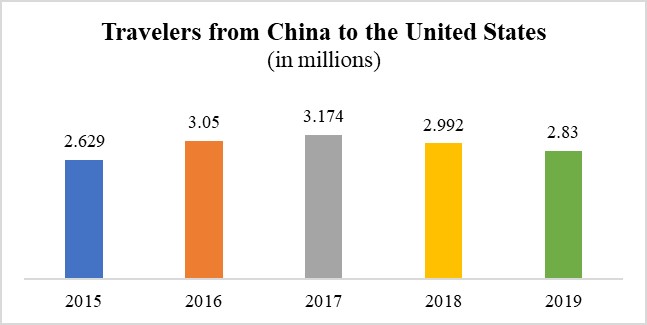
Source: NTTO
Travel to the United States by Chinese travelers contributed $33.5 billion to the U.S economy in 2019, down 3% from 2018. Even so, NTTO statistics show that Chinese travelers still represent the highest average spend per visitor, with each Chinese visitor spending an average of $11,849.
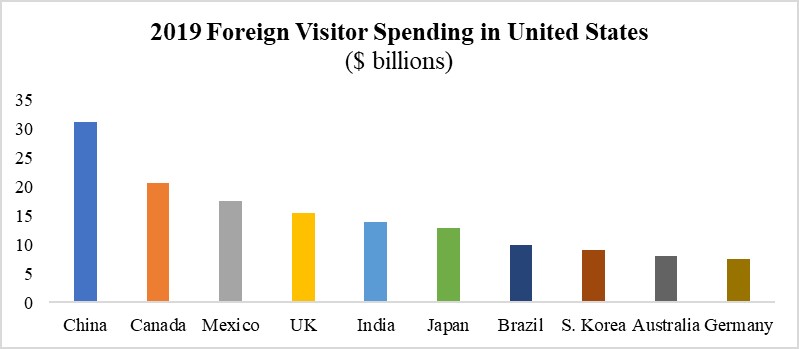
Marketing Destinations & Marketing Experiences
Historically, Chinese travelers have shown a preference for group and packaged tours. The trend is declining, however, as NTTO has reported that pre-paid package tours now only account for 16.6% of Chinese tourists to the United States, due to growing demand from “Frequent, Individual Travelers” (FIT) who organize their visits and travel independently.
The rise of the FIT traveler is accompanied by changes in consumer tastes and a decrease in the average age of the Chinese traveler. Increased availability of online travel blogs, booking sites, and other resources has enabled FIT travelers to more easily book unique travel experiences directly.
With sustained income growth, Chinese travelers are increasingly taking multiple trips abroad per year. Increasing numbers of FIT travelers with rising disposable income are driving demand for travel to U.S. destinations outside the most popular gateway or first-trip cities, such as Los Angeles, New York, San Francisco, and Las Vegas.
This trend for increase travel translates to potentially more opportunity for U.S. destinations historically less frequented by Chinese visitors. To capture this demand, destination marketing organizations and travel trade vendors must understand Chinese travelers’ preferences and promote unique experiences, including natural parks and resources, restaurants and local food scenes, musical and theater communities, and historical sights.
Travel Marketing via Social Media
Social media and mobile internet are critically important to effectively marketing U.S. travel and tourism in China. China has more than 1.1 billion mobile phone users, and, as noted in a South China Morning Post article , Chinese consumers spend an average of 43.4 hours per person per week using mobile internet. Notably, social media via mobile platforms represents an important source of news and information for Chinese consumers.
Popular social media outlets include Little Red Book , Mafengwo , Meituan , Tiktok , Weibo , and WeChat . U.S. travel providers are increasing efforts to engage and partner with Chinese social media influencers to highlight their offerings.
Mobile Payments and Transactions
Social media and mobile phones are not only critical marketing channels for U.S. travel and tourism in China, they are also increasingly popular financial transaction methods for Chinese consumers. Alipay and WeChat Pay are the two largest online payment providers in China.
An Arizona Office of Tourism presentation noted that 72% of online bookings on the top 5 online travel agencies (OTA) ( C-Trip , Fliggy , Mafengwo , Qunar , and Tuniu ) and 81% of online hotel bookings are made on mobile phones.
Growth in Chinese use of mobile payments has increasingly spurred merchants globally to accept such payments. According a report by Nielsen , a survey of Chinese tourists in 2018 found that 32% of their overseas travel spending was conducted through mobile payments.
Trade Events
GoWest 2021 March 1-5, 2021, Virtual
IPW 2021 September 18-22, 2021, Las Vegas
China International Travel Mart (CITM) November (TBC), 2021, Shanghai
Search Trends
- Learn Chinese
EXPLORE MORE
DOWNLOAD OUR APP
Copyright © 2023 CGTN. 京ICP备16065310号

Disinformation report hotline: 010-85061466
- Terms of use
- Privacy policy
China Tourism — Current Trends and Facts
Tourism in China has boomed because of its abundant tourist attractions and enhanced tourist environment. More and more foreign tourists are finding China is an ideal travel destination. A continued increase in foreign tourists is expected for the next decade.
Here is some useful information about tourism in China: where tourists go, why tourism in China is so good, trends, when tourists travel, and how tourists travel.
Rich Tourist Resources in China: Top Cities and Attractions
China covers an area of 9.6 million square kilometers (3.7M sq mi) and has a history of over 5,000 years. Famous historical and cultural sites, beautiful natural scenery, and interesting folk customs draw millions of tourists to China.
Historical and Cultural Sites
Beijing is the best place to help you learn about Chinese history during the Ming (1368–1644) and Qing (1644–1912) dynasties because Beijing served as the capital of six ancient dynasties, the most famous of which were those two dynasties.
The Forbidden City holds stories of 24 emperors who stayed there during the Ming and Qing dynasties. You can visit the palaces where they lived and worked. Pay a visit to the Summer Palace , which used to be the summer retreat for imperial families.
Visit the world's longest wall — the Great Wall , a symbol of the Chinese nation. Learn about its structure – the walls, watchtowers, and fortresses – and why it was built.
If you want to know more about China's ancient history, such as the Zhou (1045–221 BC), Han (206 BC – 220 AD), or Qin (221–206 BC) dynasties, then go to Xi'an. Serving as the capital city of 13 dynasties, Xi'an is the oldest of China's Four Great Ancient Capitals. It is often called the birthplace of Chinese civilization.
You can learn about the history of the first emperor of China by visiting the Terracotta Army . Visit the Big Wild Goose Pagoda , which houses the Buddhist materials that Xuanzang brought back from his epic journey to India.
Go to Shaanxi History Museum to feast your eyes as you see large collections ranging from the times of ape-men to the Qing Dynasty before the Opium War in 1839, and from large bronze wares to exquisite golden carvings.
In Nanjing, you can learn more about the history of the Chinese revolution from 1912 to 1949.
You can visit Ming Xiaoling Mausoleum, the tomb of the Hongwu Emperor, Zhu Yuanzhang, from the Ming Dynasty and one of the largest imperial mausoleums in existence. Go to Dr. Sun Yat-sen's Mausoleum to learn about the great deeds that Sun Yat-sen did for the Chinese revolution around the turn of the 20th century. Visit the Presidential Palace, which used to be the political and military center of China from the First Opium War in 1839 to Nanjing's peaceful liberation in 1949.
Luoyang and Xi'an alternated as capital city in the 1,500 years from the Zhou Dynasty (1046–256 BC). During 13 dynasties, 105 emperors set their capitals in Luoyang.
You can visit the Longmen Grottoes , which hold over 100,000 Buddhist images and statues. Explore White Horse Temple , which is considered to be the cradle of Chinese Buddhism. Visit Luoyang Ancient Tombs Museum , which is one of the largest museums of ancient tombs in China and the first one in the world. You can learn about the characteristics of typical tombs in Luoyang over a period of 3,000 years.
See the Top 7 Historic Cities in China .
Natural Sites
Guilin is reputed as being one of the world's most beautiful places with its karst landscapes, clean rivers, idyllic countryside, and majestic rice terraces. Slow down and allow yourself to have a relaxing vacation in Guilin.
The Li River winds through limestone peaks, which look like giant bamboo shoots growing out of the green plain. Take a Li River cruise from Guilin to Yangshuo to appreciate the karst landscape. The rice terraces in Longsheng are really beautiful. When all the rice terraces are filled with water and bathed in sunlight, the reflections are magnificent.
2. Zhangjiajie
Zhangjiajie is famous for its precarious peaks, limpid streams, dense forests, and large karst caves.
Explore Zhangjiajie National Forest Park where there are breathtaking rock pillars, which form a forest of massive pillars. Take the world's longest cable car ride to Tianmen Mountain to appreciate its towering peaks. After rainfall, the mountain is covered with thin clouds and mist. It is like a fairyland!
3. The Yellow Mountains
Oddly shaped pines twist directly out of the smooth rocks. Strangely shaped rocks make the Yellow Mountains a natural exhibition hall of rocks. The mystical sea of clouds adds an ethereal atmosphere to the Yellow Mountains, making the peaks look like islands in the sky.
You can hike up and down the mountains or take a cable car ride to admire the all-inclusive beauty. Explore off the beaten path in West Sea Grand Canyon. A sunrise at the Refreshing Terrace and a sunset at Cloud-Dispelling Pavilion are not to be missed.
4. Jiuzhaigou
Jiuzhaigou is on UNESCO's World Heritage List. It is famous for its stunning natural scenery of colorful lakes, mature forests, and spectacular waterfalls. The beautiful scenery attracts many photographers.
You can see beautiful alpine reeds swaying in the breeze in Reed Lake. See smooth blue water surrounded by dense trees gleaming under the sunlight in Sparking Lake. The reflected light jumps and flashes on the lake. Go to Five-Color Pond where the lake blazes with colors, such as green, light blue, and gray.
See the Top 10 Most Beautiful Places in China .
Folk Customs
Guizhou is located in Southwest China. Many minority groups live in Guizhou, including the Miao, Dong, Shui, and Gejia.
Visiting an ethnic village is a good way to learn about the local customs. You can learn about their traditional handicrafts, such as batik in Matang Gejia Village and papermaking in Shiqiao Miao Village. You can also take part in the Miao New Year Festival (usually from October to November). The Miao people will dress up and parade to a neighboring village, worship ancestors, and perform antiphonal singing.
You can immerse yourself in the Tibetan culture in Tibet. There are many Buddhist buildings there due to Tibetans' strong culture of faith. You can go to the Potala Palace , a testament to the Tibetan people and their beliefs, visit Jokhang Temple , the spiritual center of Tibet, and visit Yamdrok Lake , which is said to be able to help Tibetans find the reincarnated soul of the Dalai Lama.
The city of Kashgar has the most Uyghur characteristics. You can go to Kashgar Old City, the only traditional historical block with typical characteristics of ancient western regions that has been preserved in China. Visit Abakh Khoja Tomb to learn about the Islamic mazar (shrine) culture. Walk along Handicraft Street, which has an amazing range of handicrafts, including copper, metal, porcelain, woodwork, and other types of goods.
The Good Tourism Environment in China
China has developed a good tourism environment with large investments in tourism infrastructure, more favorable visa policies, and a safe environment. This decade, China has become the No. 1 destination for international tourism (if Hong Kong is included).
Well-Funded Tourism Infrastructure
China has put billions of yuan into convenient transportation. It is accessible by airplane, ships, and trains from all over the world. In China, there are many convenient ways to travel between cities, such as by airplane, high-speed train , ship, and long-distance bus on smooth expressways. There are also many inner-city transportation options. You can take a subway train, bus, taxi, or shared bike. See The Best Ways to Go to China and Travel Around .
China has high-quality hotels and restaurants. With tourism being one of the fastest growing industries in China, hotels are fast improving their facilities to Western standards, especially in the major cities. Learn more about China Hotel Star Ratings: 1-Star to 5-Star . Similarly, the restaurants in China are also developing. English menus, comfortable dining environments, and different dishes are offered.
The attractions in China also have better infrastructure. In China, attractions are divided into five levels, rated according to their quality, with the highest level being AAAAA (5A). At present, China has 259 attractions with the level of 5A. A 5A scenic spot must have excellent parking facilities and convenient access, clean and tidy tourist toilets (most have Western-style toilets), professional guides, and an orderly management system.
Favorable Visa Policies
As China is becoming increasingly popular as a travel destination, the entry and travel regulations are relaxing:
- 24, 72, and 144-Hour Visa-Free Transit
- Visa-Free Policies in Hong Kong, Macau, and Hainan
- Shanghai 15-Day Visa-Free Policy for Cruise Groups
Safe Environment
Generally speaking, China is a safe country to travel around and most people you meet are friendly, honest, and trustworthy. In major cities, such as Beijing and Shanghai, many young people can have simple conversations in English.
Continued Tourism Growth in China
In 2018, the comprehensive contribution of tourism to China's GDP was 9.94 trillion yuan, accounting for 11.04% of the total GDP. The number of inbound tourists reached 141.2 million, an increase of 1.2% over the same period the previous year.
Myanmar, Vietnam, South Korea, Japan, the United States, Russia, Mongolia, Malaysia, the Philippines, Singapore, India, Canada, Thailand, Australia, Indonesia, Germany, and the United Kingdom are the main countries of inbound tourists.
Most foreign tourists concentrate their visits in the coastal cities and a few inland areas, such as Beijing, Shanghai, Guilin, Chengdu, Yunnan, and Xi'an. As China's inland and western provinces develop, foreign and domestic tourism there is increasing. Places like Zhangjiajie are attracting more foreign tourists.
The Best Times to Travel in China
No matter which season you decide to travel in China, there are good places to visit. China shows different faces in each of the four seasons. However, the best times to visit China are spring (April–May) and autumn (September–October), when most of the popular places have their most tourism-friendly weather.
What are the highlights in different seasons in China? You can find the answers in the Best Times to Travel to China .
Ways to Travel
Usually, there are three ways to travel: independently, with a group, or to take a private tour.
If you like challenges and are well prepared for an independent China tour , then go ahead. If you are not prepared to face the challenges of traveling in China alone, there are two options for you: join group tours or take advantage of tailor-made private tours.
Why Our Private Tours Are Different
We care about you! China Highlights is the choice of discerning travelers: it's excellent for families, small groups, and individual tourists who want flexibility, local expertise, a close personal service, and to be in control of their tours.
Our journeys are consistently ranked among the best in China yet they are more moderately priced than foreign tour companies of a similar ranking.
Respected and long established (since 1998), we have teams serving people of various language groups. We offer you a money back guarantee, and we strive for integrity and quality.
Travel with Us
We are happy to show you the charm of China from different aspects. Just tell us your interests and needs, and we will tailor-make a unique China tour for you. See our recommended China tours for reference:
- 11-Day Classic Wonders — tour Beijing, Shanghai, Xi'an, and Guilin
- 13-Day Beijing, Xi'an, Chengdu, and Shanghai Educational Family Vacation — Chinese language and culture immersion tour
- Our most recommended tours
- Best China Tours 2024/2025: Top Tours for First & Return Trips
- 9-Day Beyond the Golden Triangle
- 11-Day China Classic Tour
- 2-Week Private China Tour: Beijing–Xi'an–Lhasa-Shanghai
- 15 Best Places to Visit in China (2024)
- Best (& Worst) Times to Visit China, Travel Tips (2024/2025)
- How to Plan a 10-Day Itinerary in China (Best 5 Options)
- 8 Days in China: Top 15 Tours and Itineraries (2024/2025)
- China Weather in January 2024: Enjoy Less-Crowded Traveling
- China Weather in February 2024: Places to Go, Costs, and Crowds
- China Weather in March 2024: Destinations, Crowds, and Costs
- China Weather in April 2024: Where to Go (Smart Pre-Season Pick)
- China Weather in May 2024: Where to Go, Crowds, and Costs
- China Weather in June 2024: How to Benefit from the Rainy Season
- China Weather in July 2024: How to Avoid Heat and Crowds
- China Weather in August 2024: Weather Tips & Where to Go
- China Weather in September 2024: Weather Tips & Where to Go
- China Weather in October 2024: Where to Go, Crowds, and Costs
- China Weather in November 2024: Places to Go & Crowds
- China Weather in December 2024: Places to Go and Crowds

Get Inspired with Some Popular Itineraries
More travel ideas and inspiration, sign up to our newsletter.
Be the first to receive exciting updates, exclusive promotions, and valuable travel tips from our team of experts.
Why China Highlights
Where can we take you today.
- Southeast Asia
- Japan, South Korea
- India, Nepal, Bhutan, and Sri lanka
- Central Asia
- Middle East
- African Safari
- Travel Agents
- Loyalty & Referral Program
- Privacy Policy
Address: Building 6, Chuangyi Business Park, 70 Qilidian Road, Guilin, Guangxi, 541004, China
News 8013947
Diplomatic Timeline 8013948
Xi Jinping Thought on Diplomacy 8013949
- Xi's Quotes 8020779
- Xi's Books 8020801
Opinion 8013950
Xi’s Quotes 8020779
14th China-US Tourism Leadership Summit to be held in China in 2024
BEIJING, Aug. 29 (Xinhua) -- China and the United States have agreed to hold the 14th China-U.S. Tourism Leadership Summit in the first half of 2024 in China to further revive and develop tourism cooperation between the two countries, China's Ministry of Culture and Tourism (MCT) said Tuesday.
While meeting with visiting U.S. Commerce Secretary Gina Raimondo in Beijing on Tuesday, Chinese Minister of Culture and Tourism Hu Heping said the MCT is willing to work with the U.S. Department of Commerce to boost people-to-people and cultural exchanges and increase mutual visits.
He expressed the hope that the U.S. side will work with China in the same direction, further increase direct flights between the two countries, adjust its travel advice for Chinese trips as soon as possible, and make it easier for Chinese citizens to apply for U.S. visas.
Hu also urged the U.S. side to stop groundless interrogation and harassment of Chinese citizens and delegations visiting the United States and create better conditions for mutual tourist visits.
HOME | ABOUT CTA | MANAGEMENT | STRUCTURE | RESEARCH TEAM | ACHIEVEMENTS | CULTURE | MILESTONES
According to State Commission Office of Public Sectors Reform (“SCOPSR”) Fu Zi [2007] No. 98 Documentdocument No. [2007]98, China Tourism Academywas established in Beijing on June 6, 2008. In December 2015, as approved by SCOPSR, China Tourism Academy was bestowed with an additionaltitle“title “Data Center ofNational Tourism Administration Data Center". In January 2017, it was listed as a central level scientific research public institution by the Ministry of Science and Technology. In September 2018, according to the document of the Ministry of Culture and Tourism (Ban RenIssue [2018] No. 80), the Data Center of National Tourism Administration Data Center was retitled as Data Center for of Ministry of Culture and Tourism.
As a professional research institute directly under Ministry of Culture and Tourism, China Tourism Academy (Data Center for Ministry of Culture and Tourism) aims to build itself into "Think tank of the government, brainpower of the industry and highland of the theory for industries integration development and international exchanges of the Chinese culture and tourisma government and industry think-tank, and high-level academic platform that promotes the integrated development of culture and tourism in China and international exchanges". It is mainly responsible for policy and theory study of tourism industry, research on integrated development of culture and tourism and tourism statistical work and data analysis. In August 2013, China Tourism Academy was approved to set up a post-doctoral research station. In 2014, the Tourism Economy Laboratory was accredited as the first key laboratory in the tourism industry. Since its establishment in 2008, China Tourism Academy has been continuously publishing China tourism economy blue book, nine annual development reports on inbound tourism, outbound tourism, domestic tourism, national leisure, tourism enterprise group, tourism accommodation industry, tourist attractions and travelling services, as well as academic publications, such as, China Tourism Review, China Tourism Big Data. China Tourism Academy has won Ulysses Award of Government InnovationandTechnology Innovation Award, by United Nations World Tourism Organization and,andTechnology Innovation Award, China’sinvention patent as well as other academic honors.
Currently, China Tourism Academy has set up three administrative departments, Department of Administration and Personnel, Department of International Exchange and Finance and Department of Academic Research, and seven research departmentsinstitutes, which are Institute of Strategy, Institute of Policy and Science&Education, Institute of Industry, Institute of Planning and Leisure, Institute of International Research (Institute of HK, Macao and Taiwan), Institute of Statistics Survey, and Institute of Data Analysis.
Relying on institutions of higher education, scientific research institutes, bases, local tourism management departments and enterprises and public institutions, China Tourism Academy (Data Center for Ministry of Culture and Tourism) has established altogether 3642 branches, bases, data cooperation networks and observation stations.
China Tourism Academy employs invitesdistinguished experts and scholars at homein China and abroad as academic consultants and academic committee members.
We've detected unusual activity from your computer network
To continue, please click the box below to let us know you're not a robot.
Why did this happen?
Please make sure your browser supports JavaScript and cookies and that you are not blocking them from loading. For more information you can review our Terms of Service and Cookie Policy .
For inquiries related to this message please contact our support team and provide the reference ID below.
- Culture A to Z
- Special Reports
China Tourism Day is celebrated across nation

Tengchong in Yunnan leads events with high-quality development forum
China marked the 13th China Tourism Day on Friday, with a series of activities held across the country offline and online.
China Tourism Day was launched by the State Council in 2011. The date was chosen to commemorate the day when Chinese explorer and geologist Xu Xiake (1587-1641) started his 30-year-long journey around China.
This year's theme was "Beautiful China, Happy Journey" and Heshun ancient town in Tengchong, Yunnan province, was the lead venue for nationwide celebrations.
This year's China Tourism Day has five core objectives of promoting mass tourism, exploring the development of green tourism, accelerating the cultivation of smart tourism, advocating civilized tourism, and promoting the deep integration of culture and tourism, Li Xiaoyong, an official from the Market Management Department of the Ministry of Culture and Tourism, said at a news conference in April.
From Friday to Sunday, Tengchong is hosting multiple activities including a livestreaming event, a tourism product exhibition, a Baoshan intangible cultural heritage tourism exhibition and a tourism high-quality development forum.
A highlight on Friday was the country's first provincial-level report on low-carbon travel for Chinese tourism destinations being released at the forum.
This report fills the gap in China's low-carbon travel standards, said officials from the Yunnan Provincial Department of Culture and Tourism.
Other regions in Yunnan joined in the festivities. The famous tourism destination Lijiang Ancient Town presented folk culture performances on Friday, while Chenggong district in the provincial capital Kunming issued free tickets and digital coupons for its tourist attractions.
This year's celebrations featured a "themed week" and a "themed month" in a bid to enhance the confidence of those in the tourism industry, boost tourism consumption and promote the recovery the culture and tourism sectors, Li said.
During the themed week, from Sunday to Thursday, five cities of Yangzhou, Changsha, Haikou, Xiamen and Xi'an hosted multiple countdown events, with different themes such as green tourism, cultural tourism and smart tourism.
Haikou in South China's Hainan province, for example, held a large market from Tuesday to Thursday, which exhibited a variety of local specialties and tourism products.
The event was designed to celebrate the China Tourism Day and showcase Hainan's tourism resources to attract more tourists, according to the Haikou bureau of tourism, culture, radio, television and sports.
From Friday to the following Friday, Yangzhou in Jiangsu province will invite about 100 podcast hosts to tour its major scenic spots and promote the city via their online audio programs.
Yangzhou's Slender West Lake scenic area is operating a night fair of Tang Dynasty (618-907)-style from May 12 to June 30, offering visitors games, a hanfu (a traditional Chinese style of clothing) show and acrobatic performances.
Throughout May, Beijing is holding 162 tourism-related activities including free performances, lectures, and special exhibitions.
Hundreds of scenic spots, museums, libraries and hotels in the capital are offering discounts to benefit local residents and tourists.
Additionally, 10 nationwide promotional events will last until the end of May, involving numerous cities, airlines and travel agencies.
During the May Day holiday, from April 29 to May 3, the country saw a long-awaited boom in tourism due to the optimization of pandemic control measures earlier this year.
Both the number of visits to domestic attractions and tourism-related revenue exceeded the figures of the same period in 2019, according to data from the Ministry of Culture and Tourism.
- Culture A-Z
Short video creation campaign launched in Beijing to promote Xinjiang's Aksu
NPC deputy proposes more support for grassroots museums
A brush with greatness
- Turkish shadow play has ties to Silk Road
- Pushing her boundaries
Discover the charm of Lianyungang, a city of romance
Wuhan's landmark tower to open night tours
- German violinist holds the strings on China tour
- Planting their way to prosperity
- Illiterate at 60, grandmother now author of six books at 87
- Medicine for the masses
- Museum opening launches a 'new era'
- A show of fighting spirit
- Happy hermits
- Event launched in Dunhuang to promote jiandu culture
- Citywalk, a new travel trend for youngsters exploring cultural spots
- Moving in the company of four or more
- On the road: Cool dogs and curious cats
- Reading habit on the rise among Chinese citizens
How ancient Chinese clothes helped beat the summer heat
- Things you may not know about the Spring Equinox
- Laba porridge sweetens prelude of Chinese Lunar New Year
- Must-do prep for prosperous Spring Festival in China
- Festive China: Spring Festival
- 24 Solar Terms: 6 things about Major Snow
- 24 Solar Terms: 5 things you may not know about the Start of Summer
Naked pig skiing festival draws crowds in Jilin
Spectacular sunrise marks spring equinox.
Revival of ancient arts: Craft blossoms in modern age
Confucianism TCM Animation Beijing Cultural Center Ethnic Groups Booming Culture
Eternal blossoms made with silk and wire
Beijing's baoguo book fair brings out the bibliophiles, artist's new show evokes creativity and brings warmth, dehua porcelain int'l exhibition held at un.
- Cultural Exchange
- Major Projects
- Event Listing
- Calligraphy & Painting
- Language & Literature
- Music & Dance
- Opera & Drama
- Film & TV
- Architecture & Garden
- Food & Health
- Handicrafts
- Festivals & Customs
- Clothing & Ornaments
- Myths & Legends
- World Heritage
- Intangible Cultural Heritage
- Photo & Video
- Institutions
- Culture Sections of Chinese Embassies
- China Cultural Centers
Presented by Chinaculture Registration Number: 京ICP备13028878号-4
Tourists are still not returning to China and that's not good for anybody
- International tourism to China is still well below pre-pandemic levels.
- Flights from the US are expensive and hard to find.
- Tourism is one of several economic woes in China that could spill over into the global economy.

Economists have been predicting for years that China would surpass the US as the top global economic superpower , but the country has hit some recent bumps in the road, putting that ascension into doubt. Some of China's problems include:
Chinese stocks have fallen this year and investors are pulling billions out .
The yuan has plunged 5% this year over economic concerns.
China is now in a deflationary cycle.
Youth unemployment has reached a record high of over 20% .
China's real-estate market is in shambles .
Things are so bad that some market experts are predicting the Chinese economy is heading toward a financial crash .
Now add another problem — China's tourism industry is struggling to recover from the pandemic.
Several factors have played a role in the shortage of international tourists, including challenges associated with using cash or credit cards in China and the detainment of foreigners in perceived retaliation against rival countries. However, for Americans, one of the biggest deterrents is that flights are expensive and hard to find.
There are currently just 18 round-trip flights a week between the US and China, with the two countries recently agreeing to increase that to 24 in October . While that's double the number from earlier this year, Time reports that there were 340 weekly flights between the countries before the pandemic.
On top of that, The Wall Street Journal reported that round-trip, economy-class tickets to China were going for about $4,500 this summer. Prices are up in part because US airlines stopped using Russian airspace following the invasion of Ukraine, which has increased flight times, and longer flights require more fuel.
The Wall Street Journal reported that just 52,000 people visited China from other countries with the help of a travel agency in the first quarter of this year. That was down from 3.7 million in the same period in 2019. WSJ spoke with one US agency that used to send as many as 1,500 tourists a year to China but has not had a single request since the start of the pandemic.
The China Tourism Association noted in May that "the number of visitors from Europe, America, Japan and Korea are all dropping, substantially," The Japan Times reported .
Related stories
This is in sharp contrast to travel to Europe, where the volume of foreign visitors is already back to 80% of its pre-pandemic levels .
Another factor playing a role in the lack of tourism could be fear. Not only are tensions high between the US and China, but the US government has warned Americans about the risk of traveling to there. In June, the US State Department wrote: "Reconsider travel to Mainland China due to the arbitrary enforcement of local laws, including in relation to exit bans, and the risk of wrongful detentions."
In 2021, CNN spoke with more than a dozen academics, NGO workers, and media professionals who traveled to China regularly before the pandemic. They said they were no longer willing to go, citing personal safety and the detainment of several foreign nationals.
The local boost in tourism will likely end
Earlier this year, the lack of foreign tourists was being offset by an increase in domestic tourism. Chinese travelers opted to stay closer to home, with Fan Lei, the chief financial officer of Tongcheng Travel, telling the South China Morning Post that people in China were buying fewer big-ticket items like real estate and cars and instead were spending more on experiences.
That was also the case in the US this past summer, where people spent more money on things like concerts and movies .
But China's situation could take a turn for worse soon and some fear the country's economy is heading for a "hard landing," with a substantial downturn following strong growth. This will likely lead to people in China tightening their grip on the money they do have and spending less.
China's problems could spill over into the global economy
Trouble for China's economy could mean more bad news for the rest of the world. US Treasury Secretary Janet Yellen and President Joe Biden have warned of spillover risks for the global economy , with the latter calling it a "ticking time bomb."
Several experts previously told Insider that a downturn in China's economy could cause international trade to collapse, leading to too much inventory for companies, dwindling profits, and job losses for businesses in the US and other markets. They also noted there's a risk of China exporting deflation, which could hurt corporate profits in the US.
Before the pandemic, 10.4% of global GDP — about $10 trillion — was tied to travel and tourism, and international visitors spent $1.9 trillion in 2019. Tourism hasn't returned to those levels, but they're on the rise, with travel-related GDP jumping 22% in 2022 to 7.6% and international spending up 81.9% in 2022.
People are visiting other countries again and spending money. They're just not going to China — in the end, that could hurt us all.
Watch: An investment chief at HSBC sees huge trading opportunities outside the US
- Main content
US issues level 3 travel advisory to China amid safety concerns. Here's what to know

Are you thinking about traveling to China to visit or study abroad? The U.S. government suggests reconsidering your trip for now.
According to the U.S. Department of State , traveling to China is under a level 3 travel advisory , warning Americans to reconsider. The State Department has four warning levels. The fourth is “Do not travel.”
Is it safe to travel to China right now?
The U.S. is asking Americans to reconsider traveling to China due to various reasons, including concerns about health and safety, such as the prevalence of contagious diseases like COVID-19, as well as political tensions or security risks in certain regions.
As of April 12, there are some specific areas that the U.S. is asking people to reconsider travel to. Those areas include:
- Mainland China due to the arbitrary enforcement of local laws, including exit bans and the risk of wrongful detentions.
- Exercise increased caution when traveling to the Hong Kong SAR due to the arbitrary enforcement of local laws.
- Reconsider travel to the Macau SAR due to a limited ability to provide emergency consular services.
Additionally, the U.S. government may issue travel advisories based on factors like civil unrest, natural disasters, or other hazards that could affect travelers' well-being.
Americans detained in China
Mark Swidan — a man from Houston, Texas — has been detained in China for over 10 years on drug charges. According to The Texas Tribune , Swidan was detained in China in 2012 while on a trip looking for materials for his home and business in Houston. Chinese authorities arrested him after his driver and translator were found in possession of drugs. The driver blamed Swidan, who is accused of trafficking and manufacturing methamphetamine.
A review of Swidan’s case said there were no drugs on him or in his hotel. Last year, the Republic of China’s Jiangmen Intermediate Court denied Swidan’s appeal and upheld his death penalty with a two-year suspended death sentence.
Other Americans considered wrongfully detained include Chinese American businessman Kai Li from Long Island, N.Y., and California pastor David Lin.
What countries have a Level 3 travel warning?
- Trinidad & Tobago
- El Salvador
- South Sudan
- Democratic Republic of the Congo
- Papua New Guinea
- Saudi Arabia
What countries have a Level 4 travel warning?
- Afghanistan
- Central African Republic
- North Korea (Democratic People's Republic of Korea)
- Burkina Faso
Traveling abroad? Here are some safety tips
U.S. citizens are encouraged to enroll in the State Department’s free Smart Traveler Enrollment Program and to prepare contingency plans for emergencies.
Safety tips if you're traveling outside the U.S.:
- Don't travel alone.
- Be aware of your surroundings.
- Keep a low profile.
- Try not to be flashy.
- Avoid going to places at night, especially by yourself.
Last Day To SAVE Up To €100pp*
- Destinations
- Holiday Types
- Get Inspired
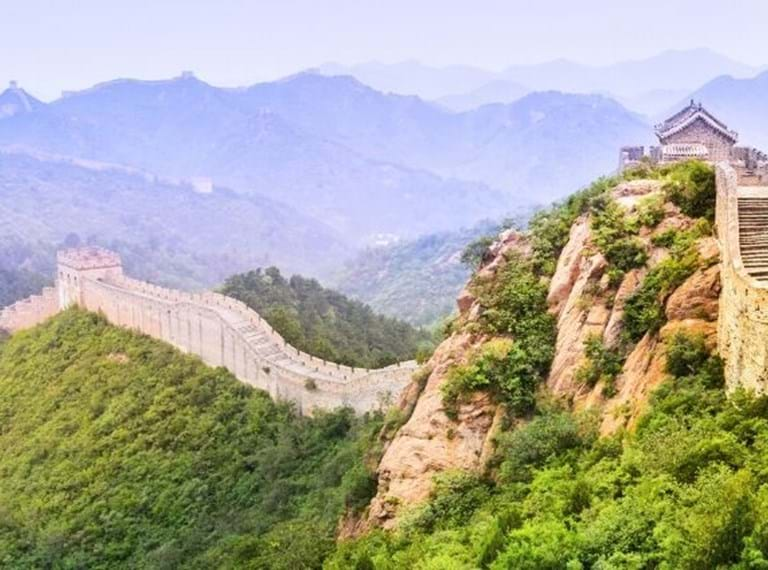
Discover Cultural China

From Beijing to Shanghai

The Great Wall & the Terracotta Warriors

Local Expert Guides to assist & inspire
Holidays to china.
Discover architecture from imperial dynasties, Buddhist temples, glittering cities and famous landmarks on our holidays to China. From ancient traditions and centuries of history to fascinating culture, we want to create memories for you that last a lifetime.
China Tours
Our China tours have been planned to show you the best of what this incredible country has to offer. A trip to China must include Beijing which is filled with must-see attractions and iconic sites. From Imperial Summer Palace to Kunming Lake, Lana Temple to the Temple of Heaven, Tiananmen Square and Beijing’s Forbidden City, there is plenty to do and see in the capital. Visit one of the 7 wonders of the world with us, where we’ll walk along the Great Wall of China, a landmark with many stories to tell.
Another historical monument that should be on your bucket list is Xi’an’s terracotta warriors, a once in a lifetime experience. Our China holidays also offer boat cruises along the Li River to Yangshuo and down the famous Yangtze River, to provide a relaxing break from the hustle and bustle. From water to flora and fauna, relax in Yu Garden, take it slow in the Old Town of Shanghai, or take it to the next level with a visit to the city of Shanghai, where East meets West in style.
Our China holidays 2024 include return airfares, transfers, 4 to 5 Star accommodation, and tours with expert local guides. Plus, they’re perfectly planned so we get the right combination of guided exploration and leisure time to truly absorb the sights and sounds of China.
Our Guided Holidays To China
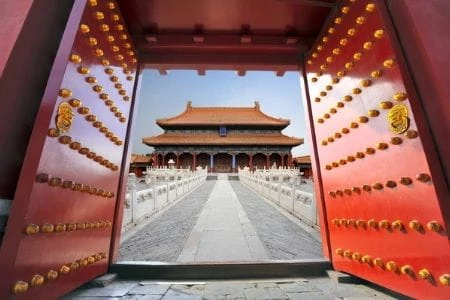
€3,149pp €3,099 pp
Beijing, Xi'an & Shanghai
Fully Guided
Flights & Transfers
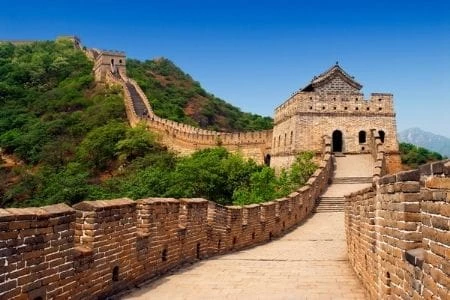
Beijing & the Great Wall of China
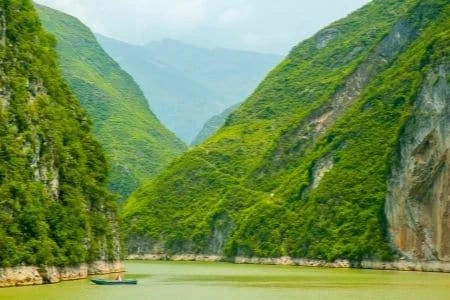
Highlights of China including the Yangtze Cruise
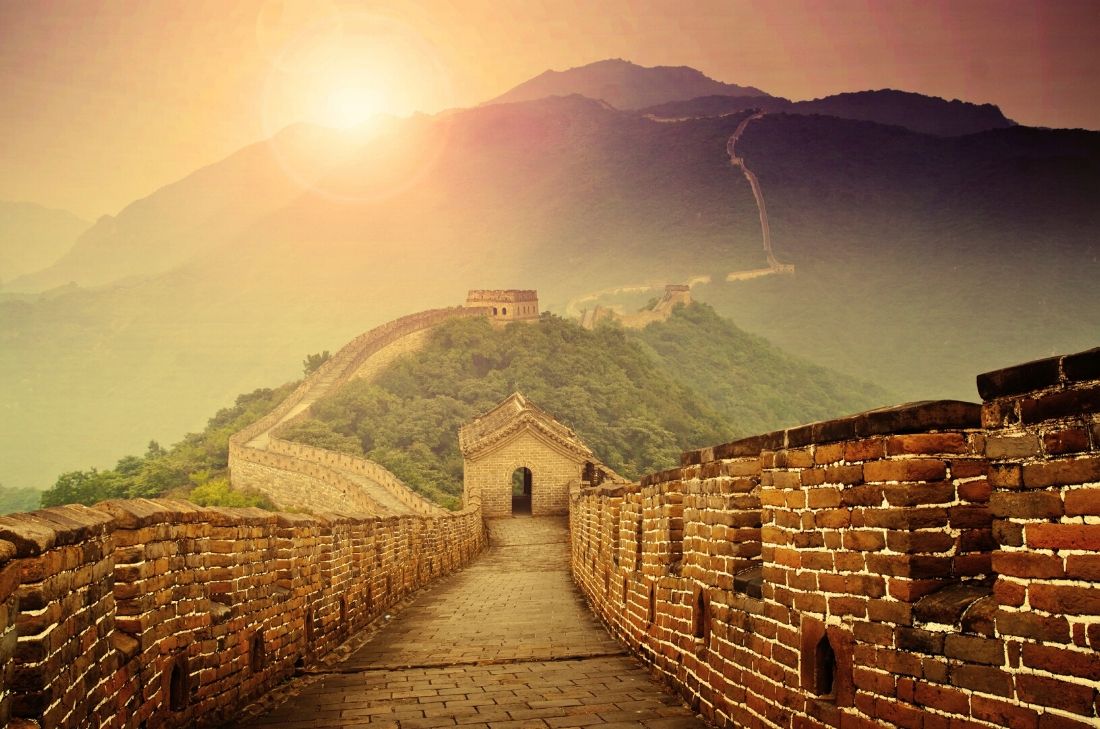
€3,799pp €3,729 pp
Beijing, Xi'an & Shanghai incl. Dubai extension
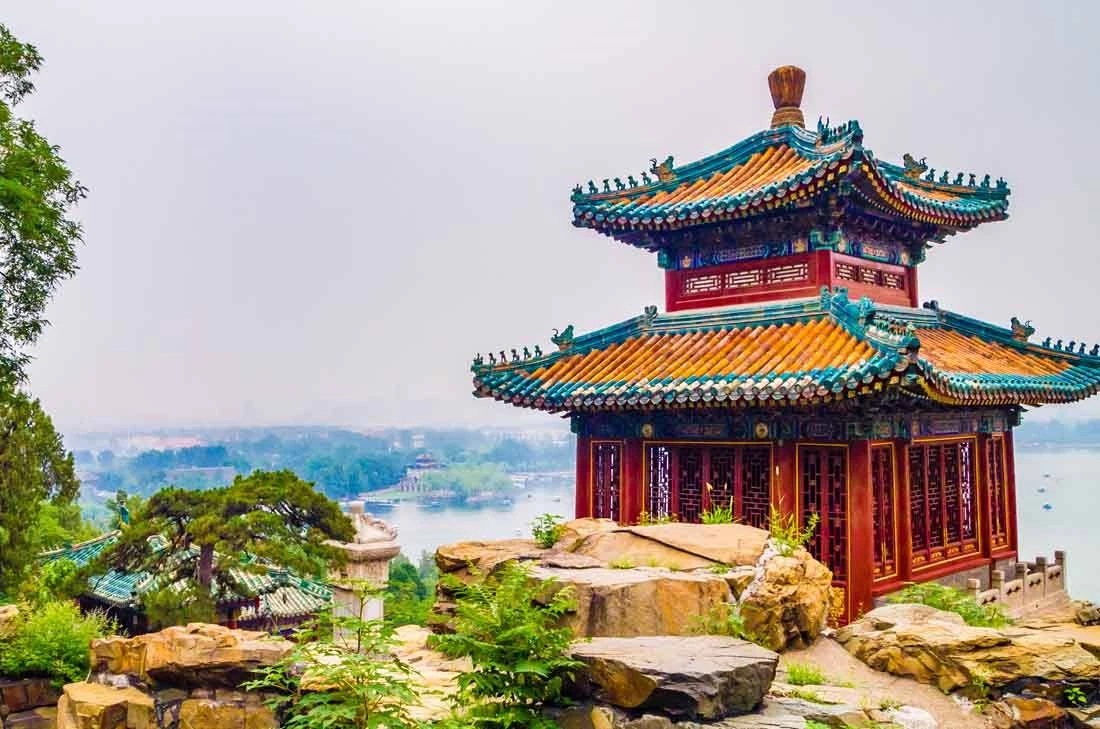
Beijing, Xi'an & Shanghai - Solo Traveller incl. Dubai extension
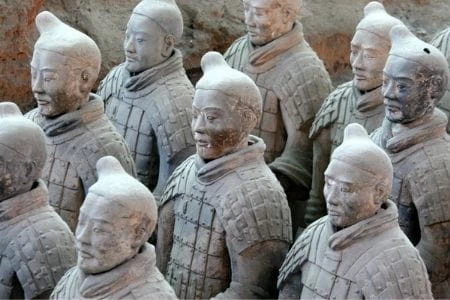
Beijing, Xi'an & Shanghai - Solo Traveller

Beijing & the Great Wall of China incl. Dubai extension

€5,029pp €4,999 pp
Explore China including Tibet
Top places to visit & tourist attractions in china.

As the capital of China, Beijing is full to the brim with must-see attractions. On our trips to China, we’ll visit Tiananmen Square, one of the largest squares in the world, and The Forbidden City, which served as the political centre of Chinese government for almost 500 years. We’ll be able to visit the attached Palace Museum, where we can learn about the many Emperors of China through a large collection of art, precious metals and sculptures. While in Beijing, we’ll also have time to stroll down the famous Qianmen Street, one of the oldest and most beautiful pedestrian streets in China.
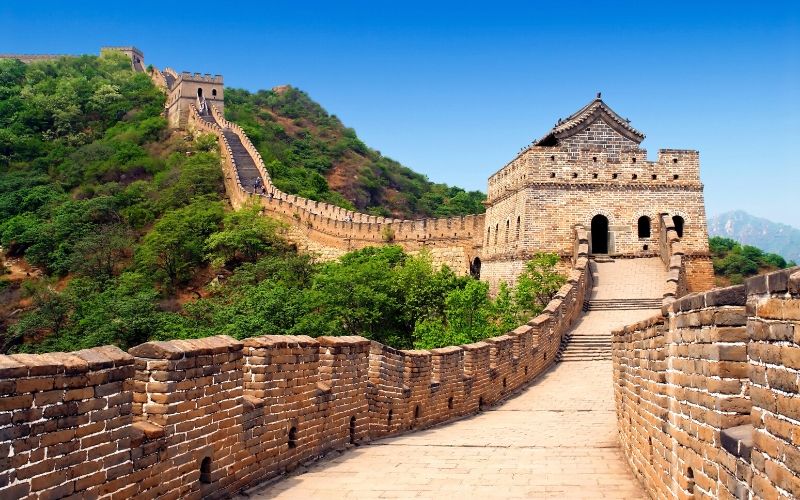
The Great Wall of China
Originally a series of smaller walls insulating various independent Chinese states, the Great Wall of China was connected more than 2000 years ago by the Emperor Qin to defend the first unified kingdom of China. Further extensions and restorations performed by the later Chinese dynasties developed the wall into the world famous feat of engineering that its known as today. On our trips to China, we’ll have the opportunity to see sections of the Great Wall and hear about its incredible history from our expert guide.
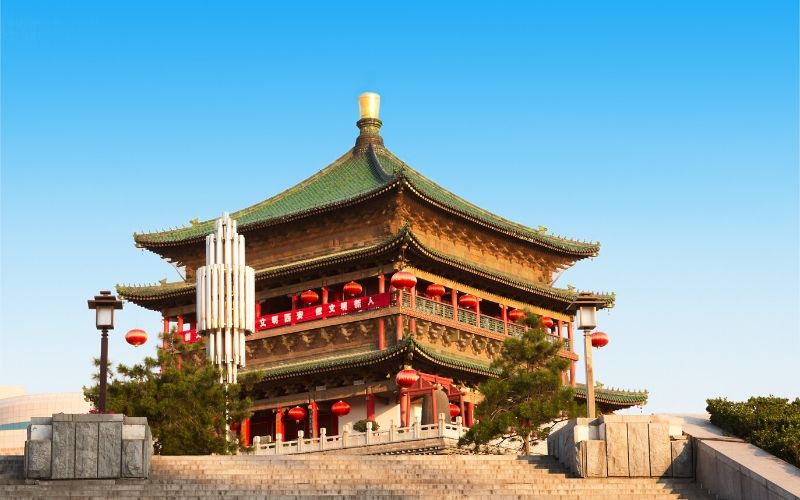
Once a vital stop on the Silk Road, Xi’an is one of the oldest and most interesting cities in China. The city is enclosed by an ancient wall which was re-constructed in the 14th century and visitors to the city can still stroll or bike along the fortification today. On our holidays to Xi’an, we’ll also get to explore the Wild Goose Pagoda, a Buddhist temple built in the 7th century, and the world-famous Terracotta Army. As always, an expert guide will be on hand to give us the history of the city and offer recommendations for what to do during our free time in Xi’an.
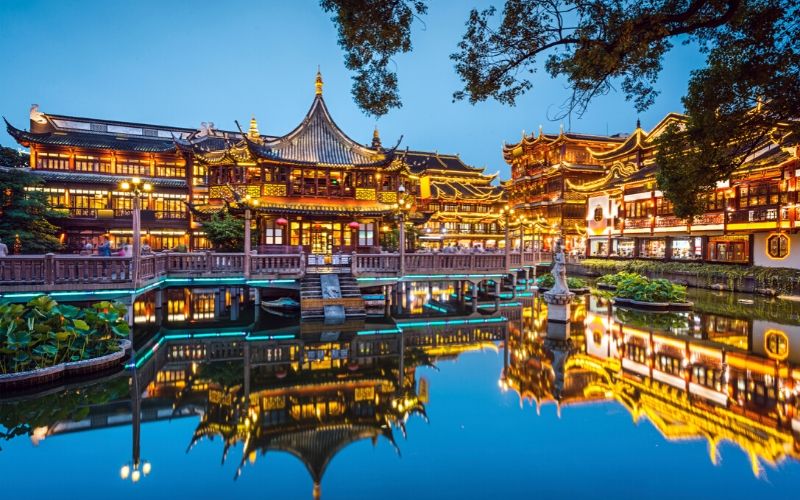
When we think of modern China, the glittering skyline of Shanghai is probably one of the first images that comes to mind. On our guided holidays to China, we’ll get to see this incredible city up close. From a trip to the top of the futuristic-looking Oriental Pearl Tower to a tour of floating Yu Garden, our expert guide will show us the highlights of this iconic city. As always, our tours allow for plenty of free time for us to savour the local culture, we recommend trying Shanghai’s most famous cuisine, Peking Duck!

Holidays & Tours In China
China is a vast and diverse country that is known not only for its incredibly rich history, but also its modern metropolitan cities and fantastic food. When joining us on one of our holidays to China, we’ll have the opportunity to immerse ourselves in this unique and fascinating culture. We’ll explore the beautiful architecture of imperial dynasties, learn about the world's creation at Buddhist temples and experience the sights and sounds of the sprawling cities of Beijing and Shanghai. Of course, the highlight of any visit is sure to be a trip to the Great Wall of China, one of the Seven Wonders of the World. Our China holidays also take us to some of its lesser-known attractions for a truly authentic experience. While traveling between China's cities, we’ll be treated to many picturesque landscapes including imposing mountains and quaint rural villages.
China Holiday FAQs
What is included in my holiday.
Travel Department holidays include flights, transfers and hotel accommodation on bed and breakfast, half board or full board basis, and excursions as specified.
All items that are included are clearly stated in our documentation. Add-ons such as insurance, bags and single room supplements are mentioned separately. In some cases you may have to pay a local departure tax or local transport cost. This will be detailed in your documentation and our local guides will assist you with these. Tipping is not included in your holiday price and information regarding tipping will also be included with your travel documents.
Will I be met at the airport?
You will be met on arrival at your destination airport and transferred to your accommodation. You will be accompanied on all included excursions by your Travel Department guide. Your expert local guide is also available to give you tips and advice on any aspect of your holiday.
What is the deposit and when is full payment due?
Deposit is required on booking and is dependent on your holiday type and starts at €100pp for city breaks. Full payment is due 10 weeks before departure hence if you book less than 10 weeks from departure full payment will be due when you book.
Do I need a Visa?
Please visit our visa page for information on requirements for each country's entry requirements
What if there is an emergency?
We have local representatives in all of our destinations who are available 24/7 as well as an emergency contact number for our offices in Ireland should you ever need it.
Reviews, Travel Tips & Advice To Inspire Your Next China Holiday
Special interests inspiration by country, 8 interesting facts about china.
- Georgina Willcox
- 24 January 2022

Inspiration by Country
Top 10 highlights of china.
We've compiled our top 10 highlights of China so that you can plan your perfect oriental escape today.

Special Interests
8 reasons to choose a guided holiday in 2024.
Discover the benefits of going on a guided tour for your next escape.

Be the first to know about our holiday updates, travel tips and special offers.
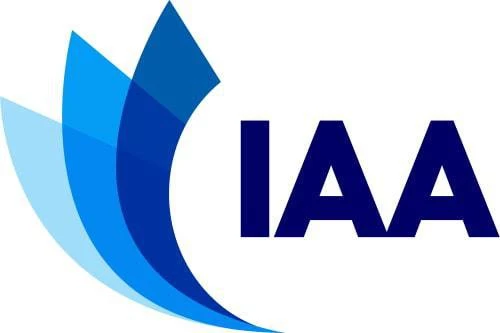
Sign up to our newsletter and don't miss out on our latest holiday updates, travel tips and special offers.
Terms & Conditions Apply
You will now be redirected to our sister website TD active. Click on the link below to proceed or close this window to cancel.
Proceed to TD active
Destinations in 70+ Countries and Regions
Quick links
- Make a Gift
- Directories
Anna Zhao Awarded 2024 Luce/ACLS Travel Grant in China Studies

The Department of Gender, Women & Sexuality Studies is proud to announce that Anna Zhao has been awarded a 2024 Luce/ACLS Travel Grant in China Studies. Part of the redesigned Luce/ACLS Program in China Studies , the grants provide $5,000 for graduate students in a PhD program or non-tenure track faculty at any career stage to visit research sites China or China studies-related archives, collections, and libraries anywhere in the world.
Zhao has been recognized as one of 11 Luce/ACLS Travel Grantees in China Studies , whose research focuses on cultures, histories, and societies in China, as well as their influence and impact on communities and cultures around the world. Zhao’s project explores the recent history of labor pain management in childbirth in contemporary China, and how both pharmaceutical and non-pharmaceutical approaches participate in the medicalization of childbirth and the shaping of state discourse around reproduction. The limited access to labor anesthesia in China exemplifies the gendered experience of pain that positions women’s birthing bodies at the intersection of state population policies, development projects, and social discourse around reproduction as a feminized labor. This project also discusses how the recent attempt to promote labor analgesia reveals the state’s pronatalist ambition in response to the dropping birth rate following the termination of the One-Child Policy.
“ACLS and the Henry Luce Foundation have partnered to advance the understanding of China for 40 years,” said Deena Ragavan, ACLS Director of International Programs. “We are excited to continue our re-envisioned Program in China Studies, which prioritizes supporting a wide diversity of scholars, institutions, and research topics and improving public understanding of Chinese cultures, histories, and societies. ACLS is proud to support the outstanding 2024 Early Career Fellows and Travel Grantees, whose research will help provide a critical, nuanced understanding of China’s past and present.”
This program is made possible by a major grant from the Henry Luce Foundation and is administered by the American Council of Learned Societies (ACLS), the leading representative of American scholarship in the humanities and interpretive social sciences.
- News Feed
- Newsletter

IMAGES
COMMENTS
Institute to Receive Complain of China Tourism: Tourism Quality Supervision Management Institute of National Tourism Administration. Working Time :8:30-12:00 14:30-17:00. Voice Tel : (010)65275315. ADD :A9 Jianguomennei Avenue, Beijing. Below is a list of Telephones of quality supervision institutes of several major tourism provinces and ...
Department of Science, Technology and Education (National Arts and Science Planning Leading Group Office) Department of Intangible Cultural Heritage; ... China Tourism Press Co., Ltd. China Tourism Academy (Data Center of the Ministry of Culture and Tourism)
The China National Tourism Administration ( CNTA; simplified Chinese: 国家旅游局; traditional Chinese: 國家旅游局; pinyin: Guójiā Lǚyóu Jú) was a Chinese government authority responsible for the development of tourism affairs and was subordinate to the State Council. [1] : 74 Its headquarters were in Beijing, with regional ...
Call us in Washington, D.C. at 1-888-407-4747 (toll-free in the United States and Canada) or 1-202-501-4444 (from all other countries) from 8:00 a.m. to 8:00 p.m., Eastern Standard Time, Monday through Friday (except U.S. federal holidays). See the State Department's travel website for the Worldwide Caution and Travel Advisories.
Customs. China Tourist Visa. Here are the documents you are to prepare before submission of visa application. Getting a visa. Consular Authentication of Documents in China. Notice of port visa application procedures for foreigners. Q & A.
July 19, 2023 2:41 pm (EST) After China removed most of its COVID-related cross-border travel restrictions, foreign tourists are slowly returning. Ctrip, one of China's largest online travel ...
China alone contributed 51% of the travel and tourism GDP in the Asia-Pacific region in 2018, according to the World Travel and Tourism Council. And Chinese travelers typically accounted for 30% ...
Reissued with updates to COVID-19 information. Reconsider travel to the People's Republic of China (PRC), including the Hong Kong Special Administrative Region (SAR) and the Macau SAR, due to the surge in COVID-19 cases, arbitrary enforcement of local laws, and COVID-19-related restrictions. See specific risks and conditions in each jurisdiction below.
370 Lexington Ave, Suite 400, New York, NY 10017, New York, USA | Phone: (212) 760-8218 | Email: [email protected]
China sets out 5-year path for tourism. The State Council, in a circular on Jan 20, announced a development plan for the tourism sector during the 14th Five-Year Plan period (2021-2025). By 2025, China will have a stronger modern system for the tourism sector integrating cultural development and boasting an improved barrier-free environment and ...
The U.S. State Department maintains a "Level 3" travel alert on China, warning Americans to "reconsider travel" to the country because of "the risk of wrongful detentions," among other ...
China was the fifth-largest source of international travelers to the United States in 2019. In a report from the U.S. Department of Commerce's National Travel and Tourism Office (NTTO), data showed the number of travelers from China fell about 6% in 2018 to 2.99 million and fell another 5% in 2019 to 2.83 million. The ongoing COVID-19 pandemic and the suspension of many air routes will ...
Figure 1. ). Figure 1. 'Technology' and 'Chinese tourists' research (2000-2020) Display full size. A further analysis of the reviewed literature uncovered an exciting, enriched, and enlightening network of scholarly forays into the front edge of technology and tourism. Based on the same sample of journals, Figure 2.
Domestic tourist trips in China surpassed 1.8 billion from June to August, with revenue exceeding 1.2 trillion yuan (about $165 billion), according to latest data from the China Tourism Academy (CTA). The travel market this summer was significantly hotter than the same period in 2019, with popular destinations receiving the highest number of ...
Here is some useful information about tourism in China: where tourists go, why tourism in China is so good, trends, when tourists travel, and how tourists travel. Rich Tourist Resources in China: Top Cities and Attractions. China covers an area of 9.6 million square kilometers (3.7M sq mi) and has a history of over 5,000 years.
BEIJING, Aug. 29 (Xinhua) -- China and the United States have agreed to hold the 14th China-U.S. Tourism Leadership Summit in the first half of 2024 in China to further revive and develop tourism cooperation between the two countries, China's Ministry of Culture and Tourism (MCT) said Tuesday. While meeting with visiting U.S. Commerce Secretary ...
Data from China's National Immigration Administration showed 141 million total exits and entries in the first quarter of 2024. Foreign nationals accounted for 13 million of those, roughly a ...
Impact of COVID-19 on China tourism. Since the beginning of the COVID-19 pandemic, tourism researchers have been quick in researching the impact of COVID-19 on the tourism industry in different scales (i.e. sector, country, region) (Huang & Wang, Citation 2023).Huang and Wang (Citation 2023) reviewed the COVID-19-related empirical studies published in the social science citation index (SSCI ...
About CTA. According to State Commission Office of Public Sectors Reform ("SCOPSR") Fu Zi [2007] No. 98 Documentdocument No. [2007]98, China Tourism Academywas established in Beijing on June 6, 2008. In December 2015, as approved by SCOPSR, China Tourism Academy was bestowed with an additionaltitle"title "Data Center ofNational Tourism ...
The return of China's travelers has long been awaited in the travel industry, which is expected to surpass pre-pandemic levels this year by contributing $11.1 trillion to the global economy. The ...
U.S.-China Relations. The United States seeks a constructive, results-oriented relationship with China. The United States works to achieve concrete progress on U.S. interests, including ensuring Chinese support for exerting maximum pressure on North Korea to end its nuclear program, reducing the U.S. trade deficit with China, and stopping the ...
China Tourism Day was launched by the State Council in 2011. The date was chosen to commemorate the day when Chinese explorer and geologist Xu Xiake (1587-1641) started his 30-year-long journey around China. This year's theme was "Beautiful China, Happy Journey" and Heshun ancient town in Tengchong, Yunnan province, was the lead venue for ...
Blinken will raise with Chinese officials steps they must take before the State Department lowers its Level 3 travel warning for American tourists, which urges Americans to "reconsider travel ...
Before the pandemic, 10.4% of global GDP — about $10 trillion — was tied to travel and tourism, and international visitors spent $1.9 trillion in 2019. Tourism hasn't returned to those levels ...
According to the U.S. Department of State, traveling to China is under a level 3 travel advisory, warning Americans to reconsider travel.
Our China holidays 2024 include return airfares, transfers, 4 to 5 Star accommodation, and tours with expert local guides. Plus, they're perfectly planned so we get the right combination of guided exploration and leisure time to truly absorb the sights and sounds of China.
About Us. China Tourism Group Co., Ltd. (hereinafter referred to as CTG), has been adhering to the enterprise development concept of science and technology as core of hard power, and is committed to improving the comprehensive service level of the tourism industry with the most advanced technology. With the world's top 500 enterprises ...
Zhao has been recognized as one of 11 Luce/ACLS Travel Grantees in China Studies, whose research focuses on cultures, histories, and societies in China, as well as their influence and impact on communities and cultures around the world. Zhao's project explores the recent history of labor pain management in childbirth in contemporary China ...
The U.S. Department of Transportation on March 31 increased the cap to allow 50 ... Local demand for travel to China has surged since the country reopened its borders in January 2023 by ...
Secretary of State Antony J. Blinken will travel to the People's Republic of China (PRC) April 24-26. The Secretary will meet with senior PRC officials in Shanghai and Beijing to discuss a range of bilateral, regional, and global issues, including the crisis in the Middle East, Russia's war against Ukraine, cross-Strait issues, and the South China Sea.